Oakland, Austin, San Francisco, Denver, Tampa, Seattle, New York City, Saint Petersburg, Fort Myers, Sarasota, Boise, Jacksonville, Detroit, New Orleans, Portland, Arlington, Naples, Mesa, Aurora, Reno, Scottsdale.
By Wolf Richter for WOLF STREET.
Condo prices are falling in many markets across the US, and in quite a few of the bigger markets, they’re now falling at a brisk pace.
But in the 2.5 years from the beginning of 2020 through mid-2022, condo prices had exploded, in numerous markets by 50%, 60%, or even 70%, topped off by Phoenix, Mesa, and Naples, and in some cities continued to explode for another year or so, forming a fantastic condo bubble, visualized in the charts below, amid astounding buying behavior of FOMO and investor-mania born out of the Free-Money era.
In the 10 years to the peak, prices exploded by 200% (Jacksonville, Tampa), by 260% (Arlington, TX), 300% (Detroit, Aurora, CO), or even 350% (Phoenix, Mesa, AZ).
And now those prices are coming down hard in many markets.
But Phoenix is not yet on this list because the minimum requirement for the list is a 12% drop from the peak, while condo prices in Phoenix have dropped by only 11.5% so far. Some other cities, such as Orlando and San Antonio, share Phoenix’s fate of having missed this list by a hair. But 21 other markets made this list.
Some of the markets on this list peaked in 2022, others peaked later. Arlington, TX, peaked in June 2024, and condo prices have since then careened down by 13.9%, including another 0.9% in July.
The 21 cities with price declines of 12% to 26% through July:
- Oakland, CA: -26%
- Austin, TX: -24%
- Saint Petersburg, FL: -23%
- Fort Myers, FL: -19%
- Sarasota, FL: -19%
- San Francisco, CA: -16%
- Jacksonville, FL: -15%
- Boise, ID: -14%
- Detroit, MI: -14%
- Denver, CO: -14%
- Tampa, FL: -14%
- Arlington, TX: -14%
- Naples, FL: -14%
- New Orleans, LA: -13%
- Seattle: -13%
- Reno, NV: -13%
- Mesa, AZ: -12%
- Portland, OR: -12%
- Aurora, CO: -12%
- New York City: -12%
- Scottsdale, AZ: -12%.
Month-to-month, 20 of these 21 cities experienced price declines in July (the exception, New York City, unchanged), topped off by these cities:
- Myers: -2.1%
- Petersburg: -2.0%
- Oakland: -1.8%
- Sarasota: -1.5%
- Tampa: -1.3%
- Naples: -1.2%
- Jacksonville: -1.1%
- Aurora: -1.0%
Year-over-year, 19 of the 21 cities experienced price declines in July (exceptions: Boise unchanged, New York City up), topped off by:
- Petersburg: -15.0%
- Myers: -14.6%
- Arlington, TX: -13.9%
- Sarasota: -12.6%
- Oakland: -11.4%
- Jacksonville: -10.7%
- Naples: -10.1%
- Tampa: -9.8%
- Aurora, CO: 7.6%
- Denver: -7.4%
- Austin: -5.9%
- Atlanta: -5.7%
In some densely populated cities, such as San Francisco, condos often make up a bigger part of home sales than single-family homes.
Methodology and data: These prices here are seasonally adjusted three-month averages of “mid-tier” condos and co-ops in “cities” (not in metros or Metropolitan Statistical Areas) from the Zillow Home Value Index (ZHVI), which is based on millions of data points in Zillow’s “Database of All Homes,” including from public records (tax data), MLS, brokerages, local Realtor Associations, real-estate agents, and households across the US. It includes pricing data for off-market deals and for-sale-by-owner deals. These are not median prices.
Condo Bust in process:
In the little tables for each city below, the sharp month-to-month drops indicate that the declines heated up. The drops are not seasonal because the index is seasonally adjusted.
The metrics in each table from left to right: price decline from the peak, change from prior month (MoM), change year-over-year (YoY), and remaining increase since January 2000.
Since mid-2022: He who panicked first, panicked best.
| Oakland, CA, City, Condo Home Prices | |||
| From May 2022 peak | MoM | YoY | Since 2000 |
| -26% | -1.8% | -11.4% | 161% |
Lowest prices since January 2016. That was 9.5 years ago. In each of the last three months, prices dropped by 1.8%. That’s fast!
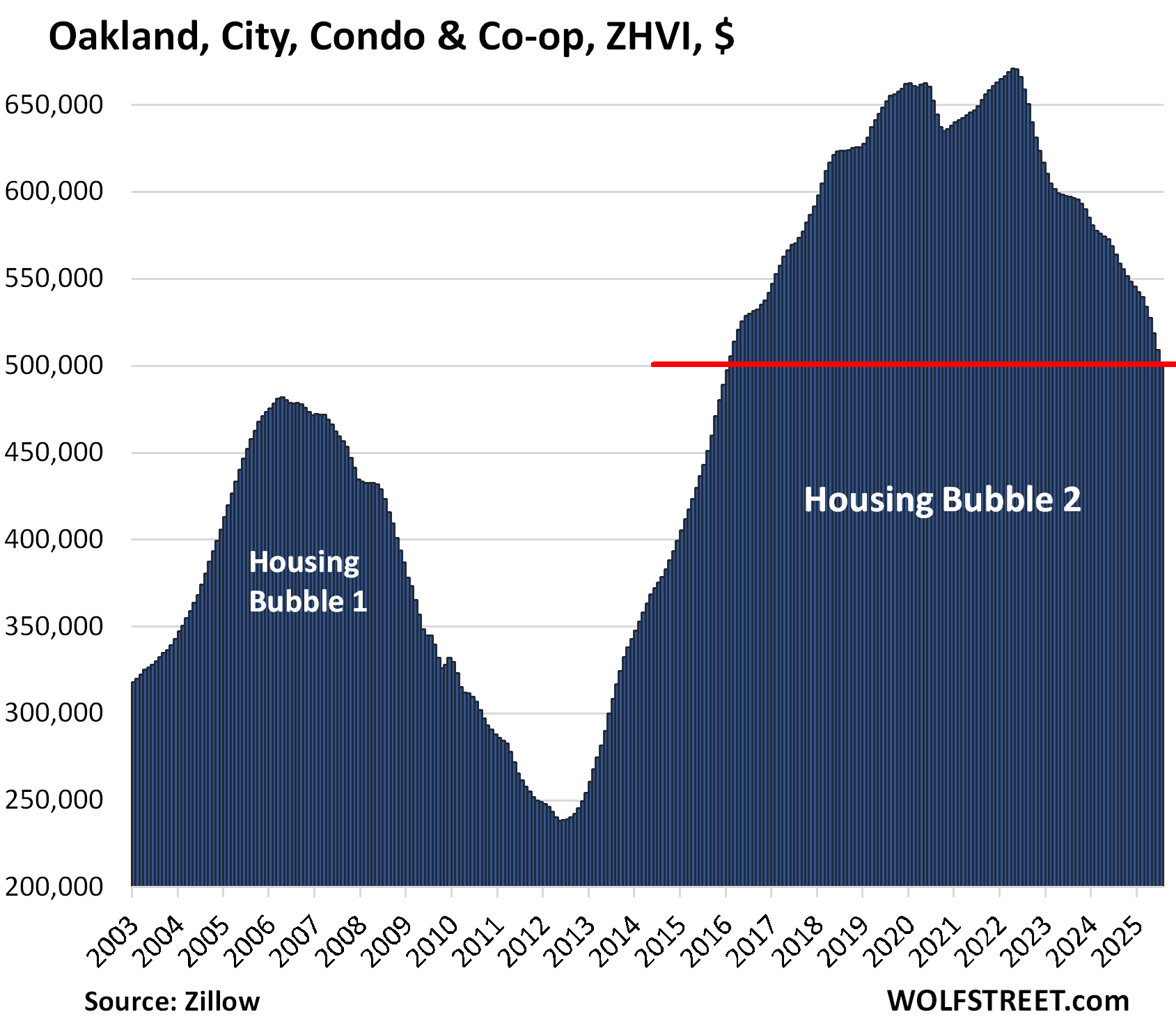
| Austin, TX, City, Condo Prices | |||
| From Jul 2022 peak | MoM | YoY | Since 2000 |
| -24% | -0.8% | -5.9% | 115% |
Lowest since April 2021.
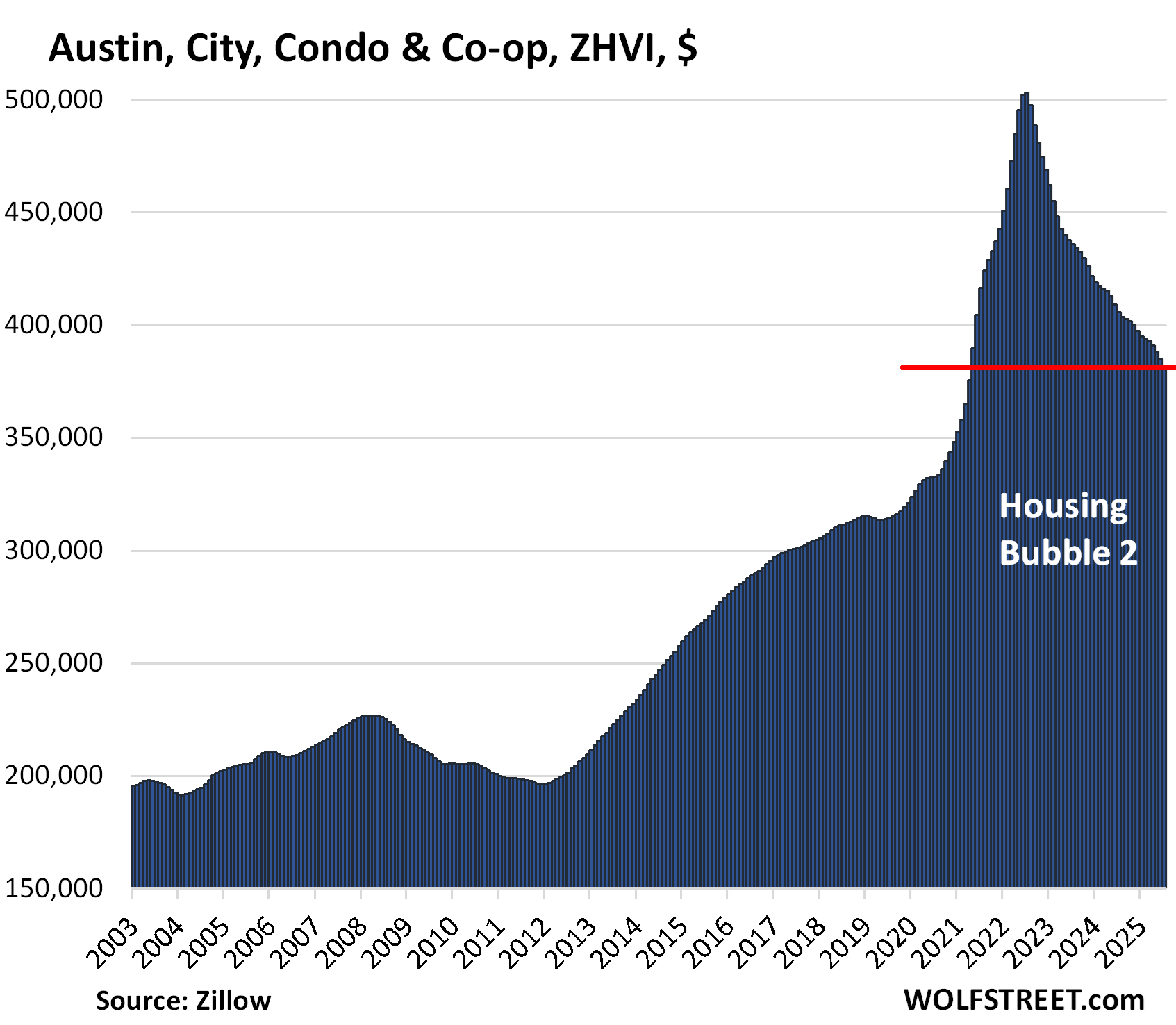
| Saint Petersburg, Fl, City, Condo Prices | |||
| From Oct 2022 peak | MoM | YoY | Since 2000 |
| -23% | -2.0% | -15% | 204% |
That 2.0% month-to-month plunge follows the 1.8% plunge in June.
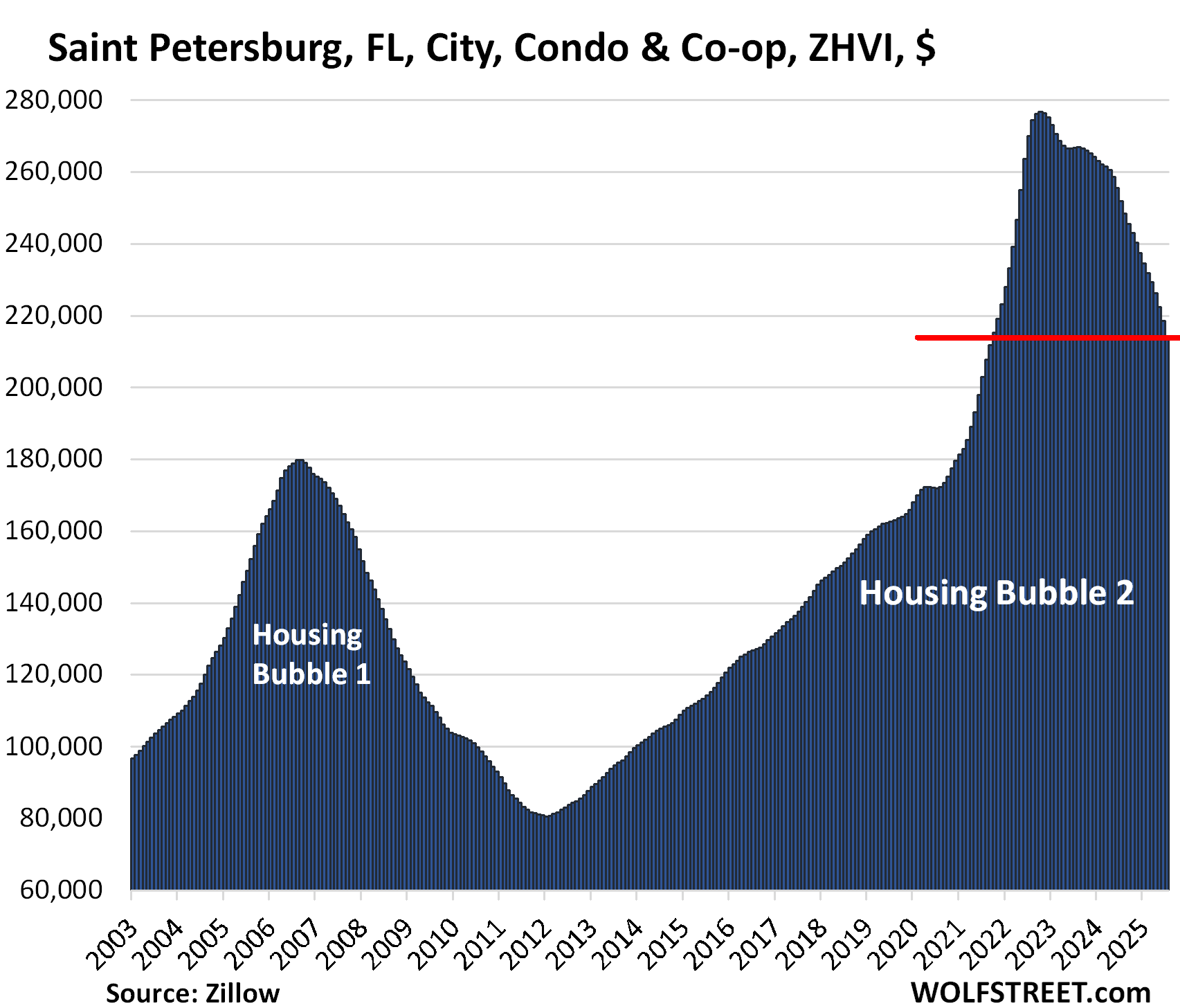
| Fort Myers, FL, City, Condo Prices | |||
| From July 2022 peak | MoM | YoY | Since 2000 |
| -19% | -2.1% | -15% | 142% |
The 2.1% plunge in July, followed the 2.0% plunges in June and May:
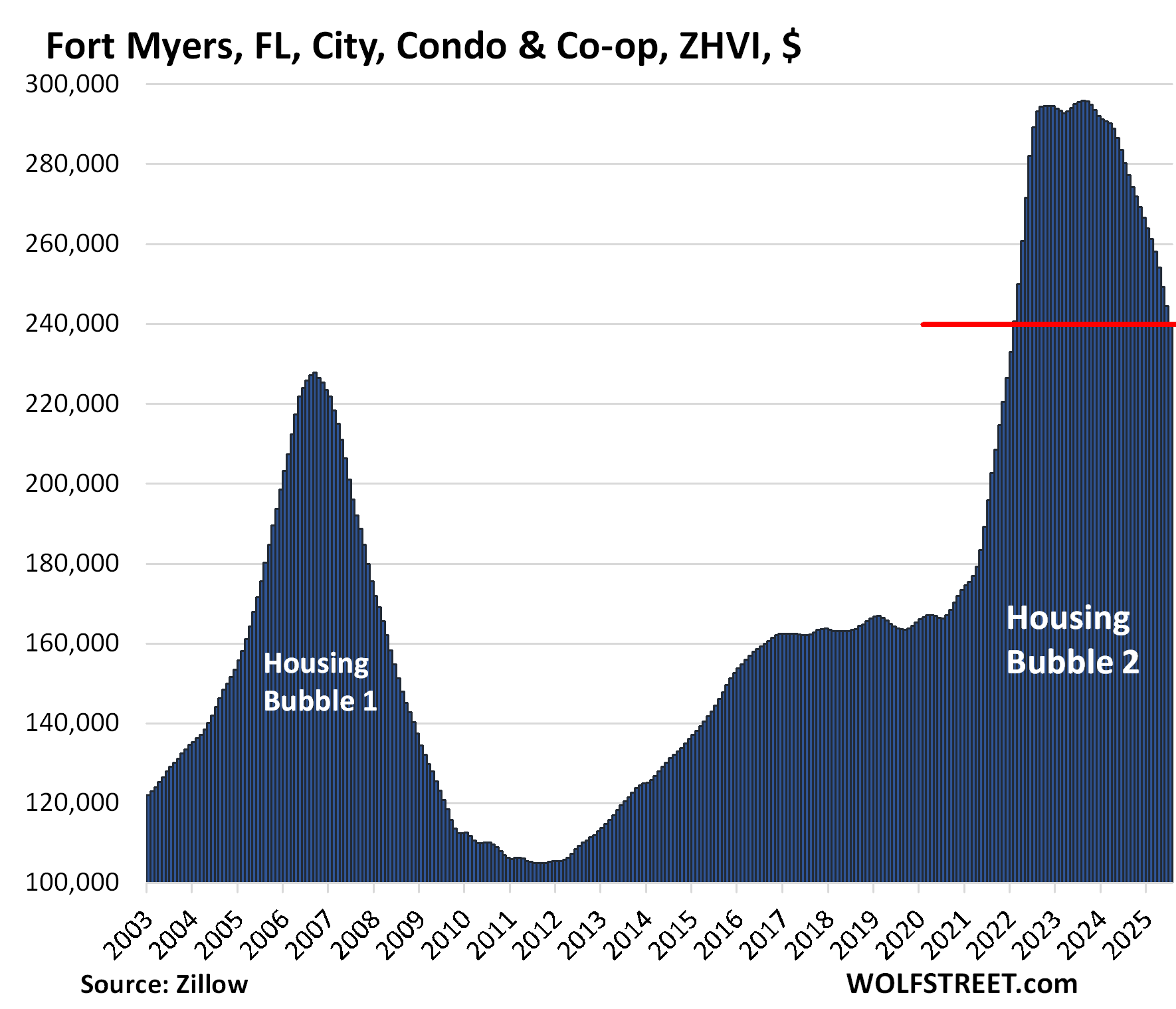
| Sarasota, FL, City, Condo Prices | |||
| From Jul 2022 peak | MoM | YoY | Since 2000 |
| -19% | -1.5% | -12.6% | 154.6% |
That 1.5% month-to-month drop followed the 1.3% drop in June.
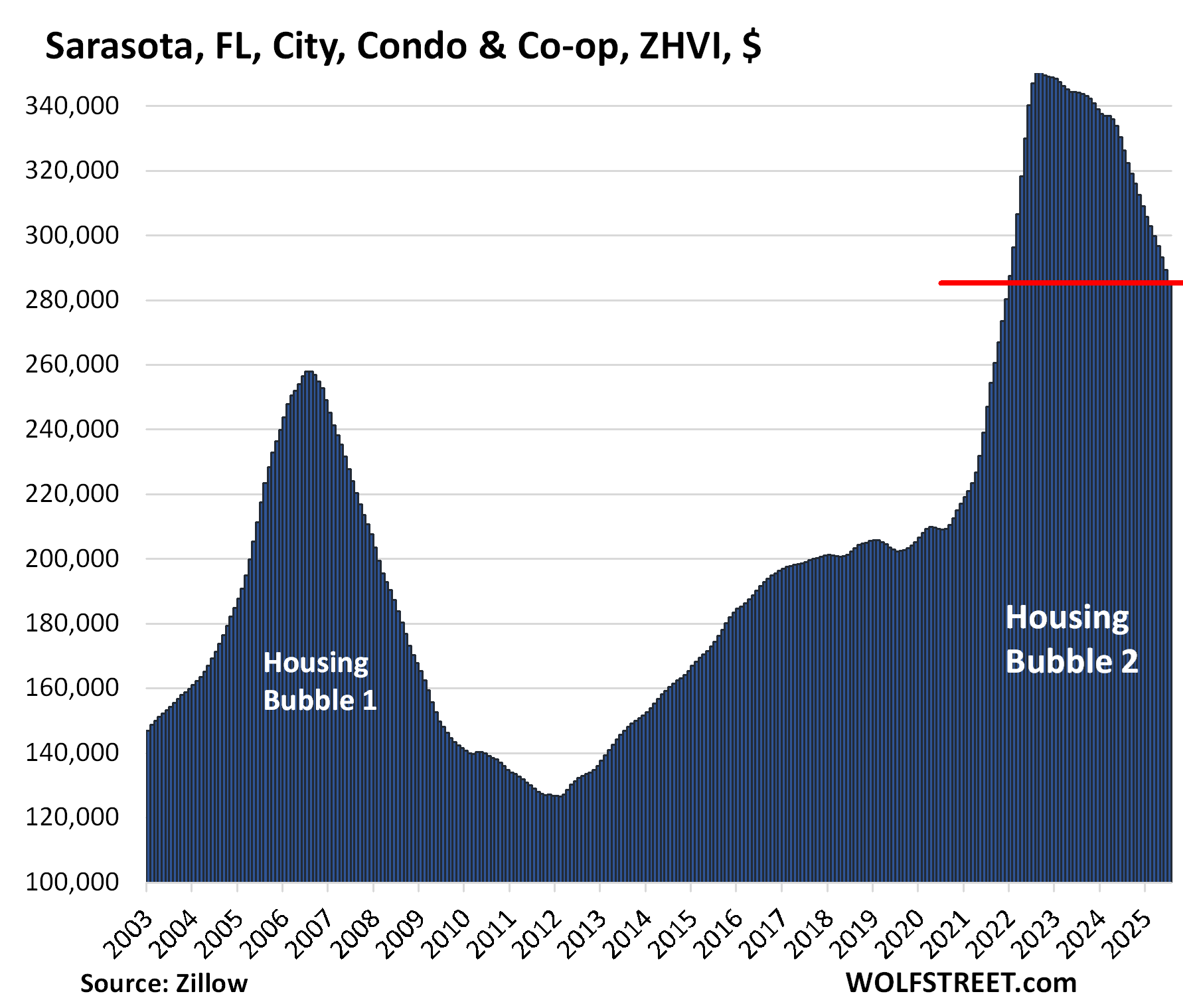
| San Francisco, CA, City, Condo Prices | |||
| From May 2022 peak | MoM | YoY | Since 2000 |
| -16% | -0.5% | -1.8% | 140% |
Back to March 2015.
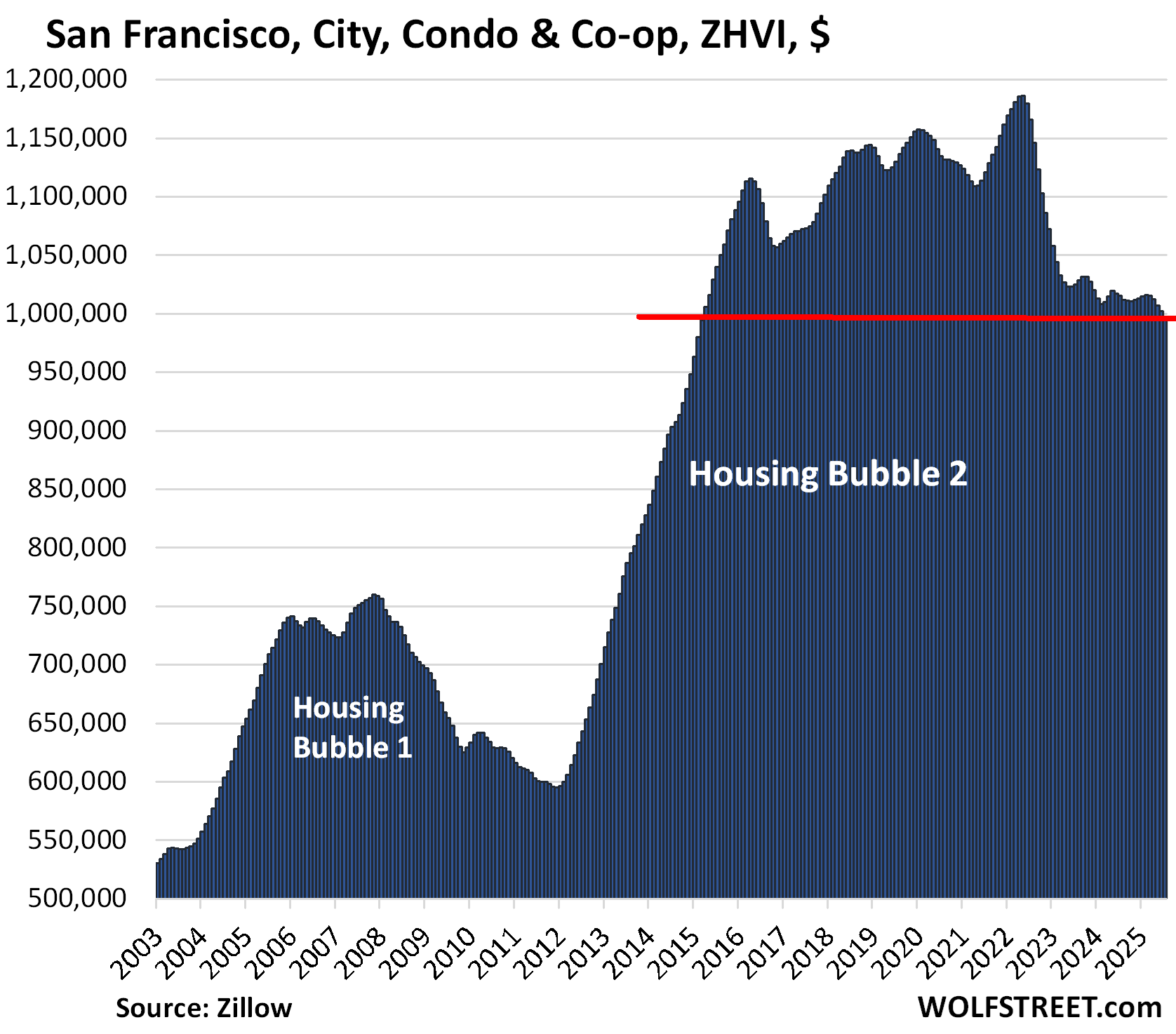
| Jacksonville, FL, City, Condo Prices | |||
| From Nov 2022 peak | MoM | YoY | Since 2000 |
| -15% | -1.1% | -10.7% | 158% |
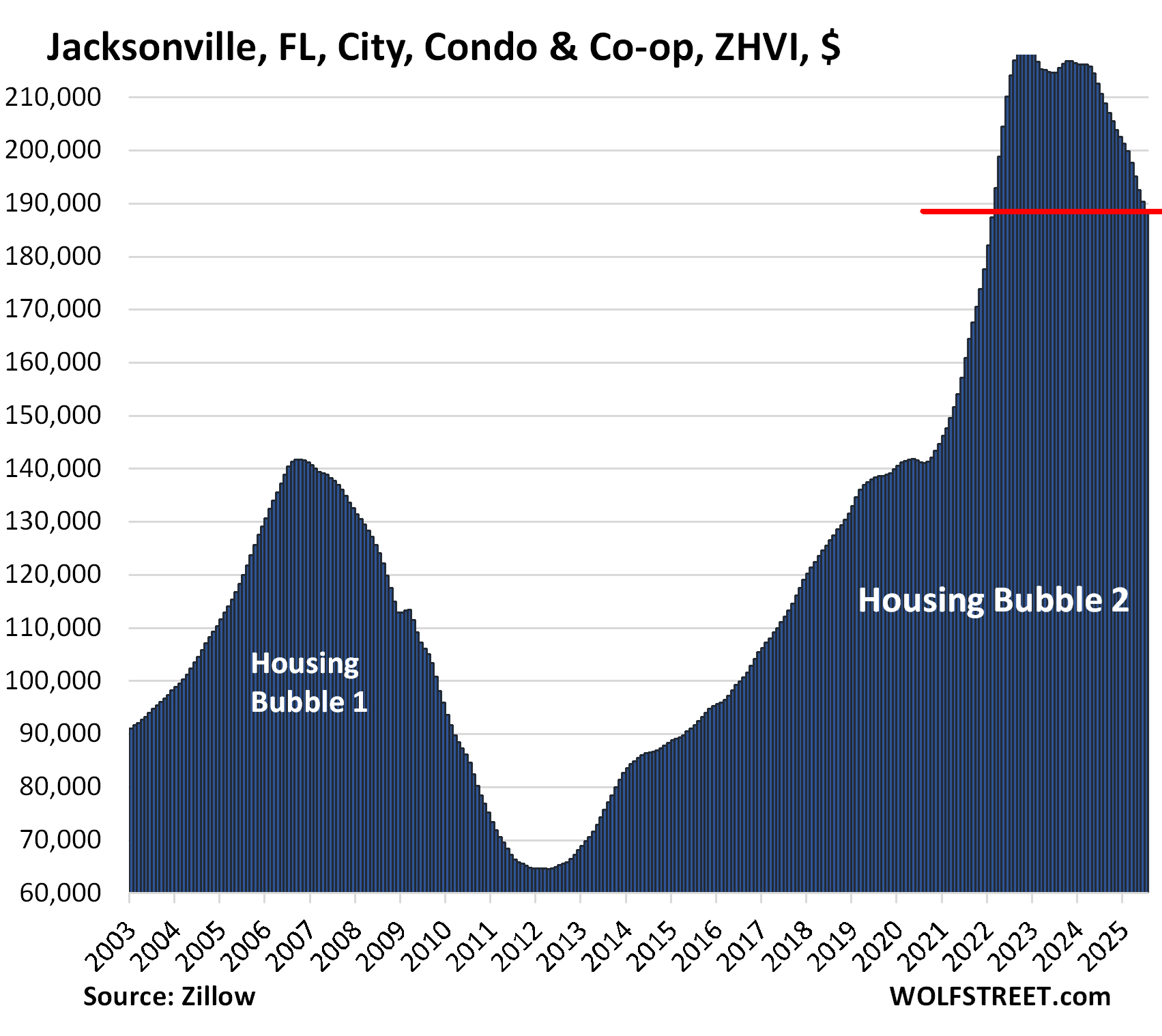
| Boise, ID, City, Condo Prices | |||
| From Jun 2022 peak | MoM | YoY | Since 2001 |
| -14% | -0.1% | 0% | 220% |
Back to 2021. But prices have essentially not moved over the past 12 months.
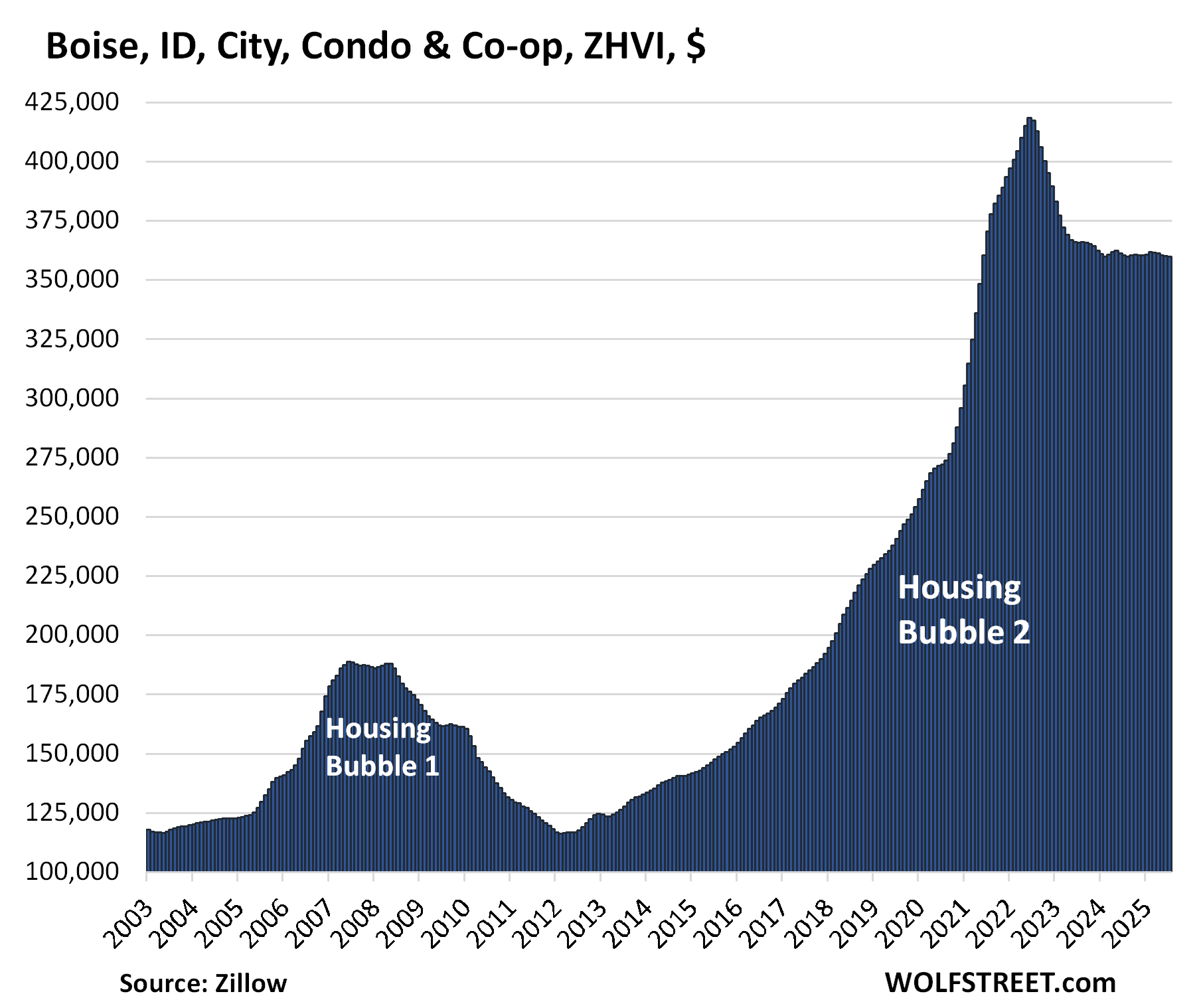
| Detroit, MI, City, Condo Prices | |||
| From Sep 2021 peak | MoM | YoY | Since 2000 |
| -14% | -0.4% | -3.6% | 269% |
Where prices had first been in 2018.
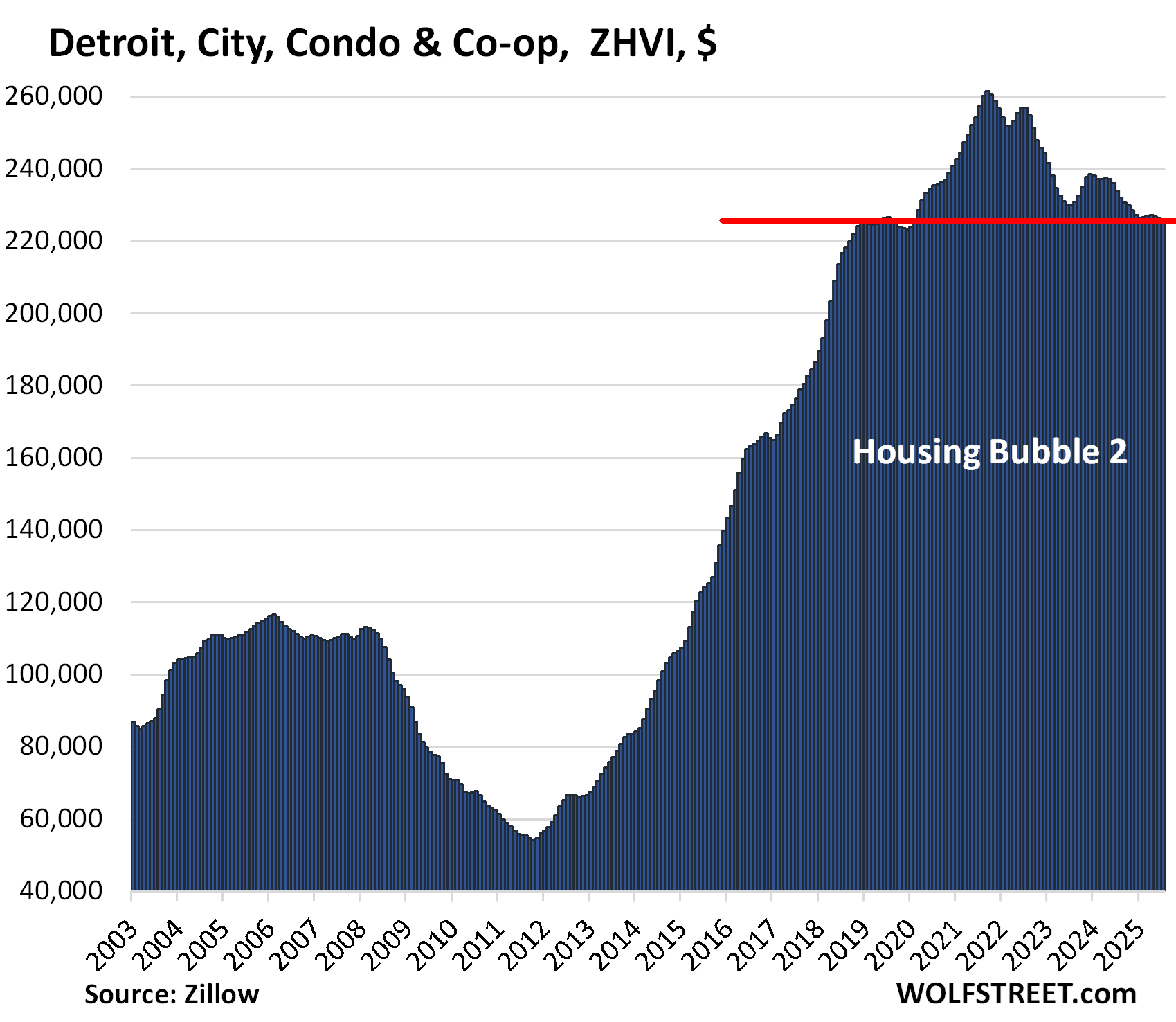
| Denver, CO, City, Condo Prices | |||
| From Jul 2022 peak | MoM | YoY | Since 2000 |
| -14% | -0.9% | -7.4% | 140% |
Back to June 2021.
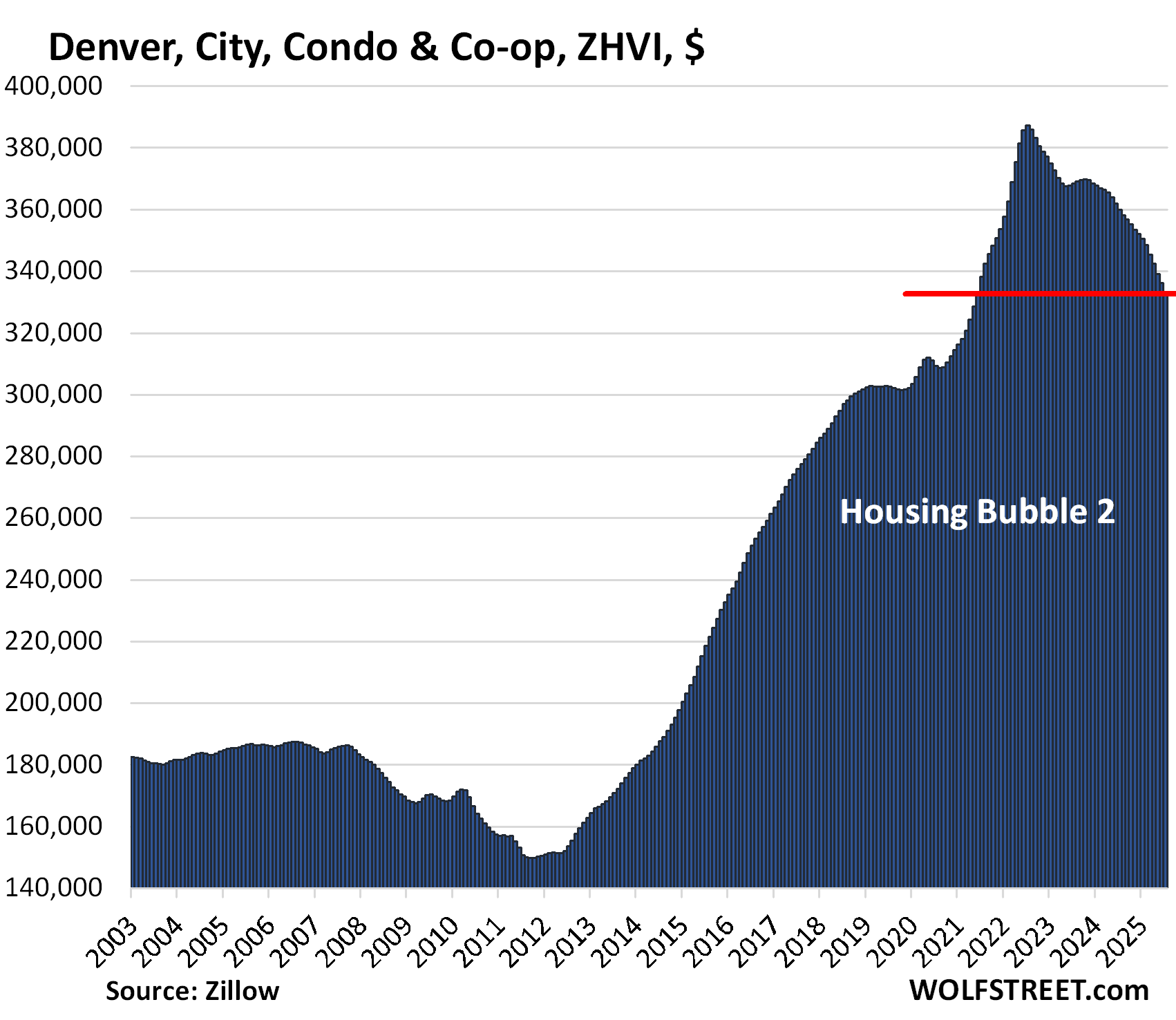
| Tampa, FL, City, Condo Prices | |||
| From Sep 2022 peak | MoM | YoY | Since 2000 |
| -14% | -1.3% | -9.8% | 275% |
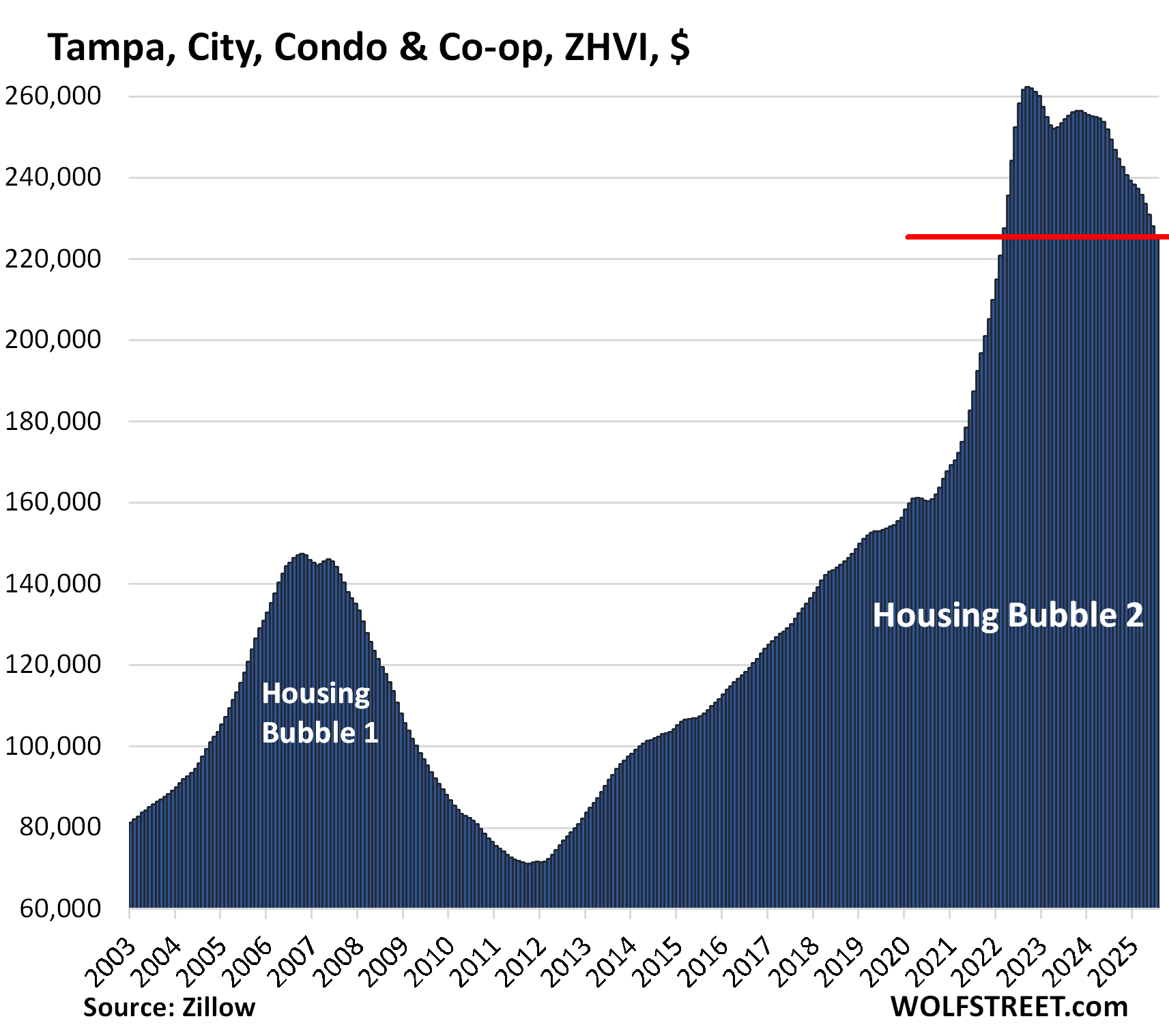
| Arlington, TX, City, Condo Prices | |||
| From Jun 2024 peak | MoM | YoY | Since 2000 |
| -14% | -0.9% | -13.9% | 241% |
Of the 262% price increase in the 10 years to June 2024, half came during the four years from mid-2020 through mid-2024.
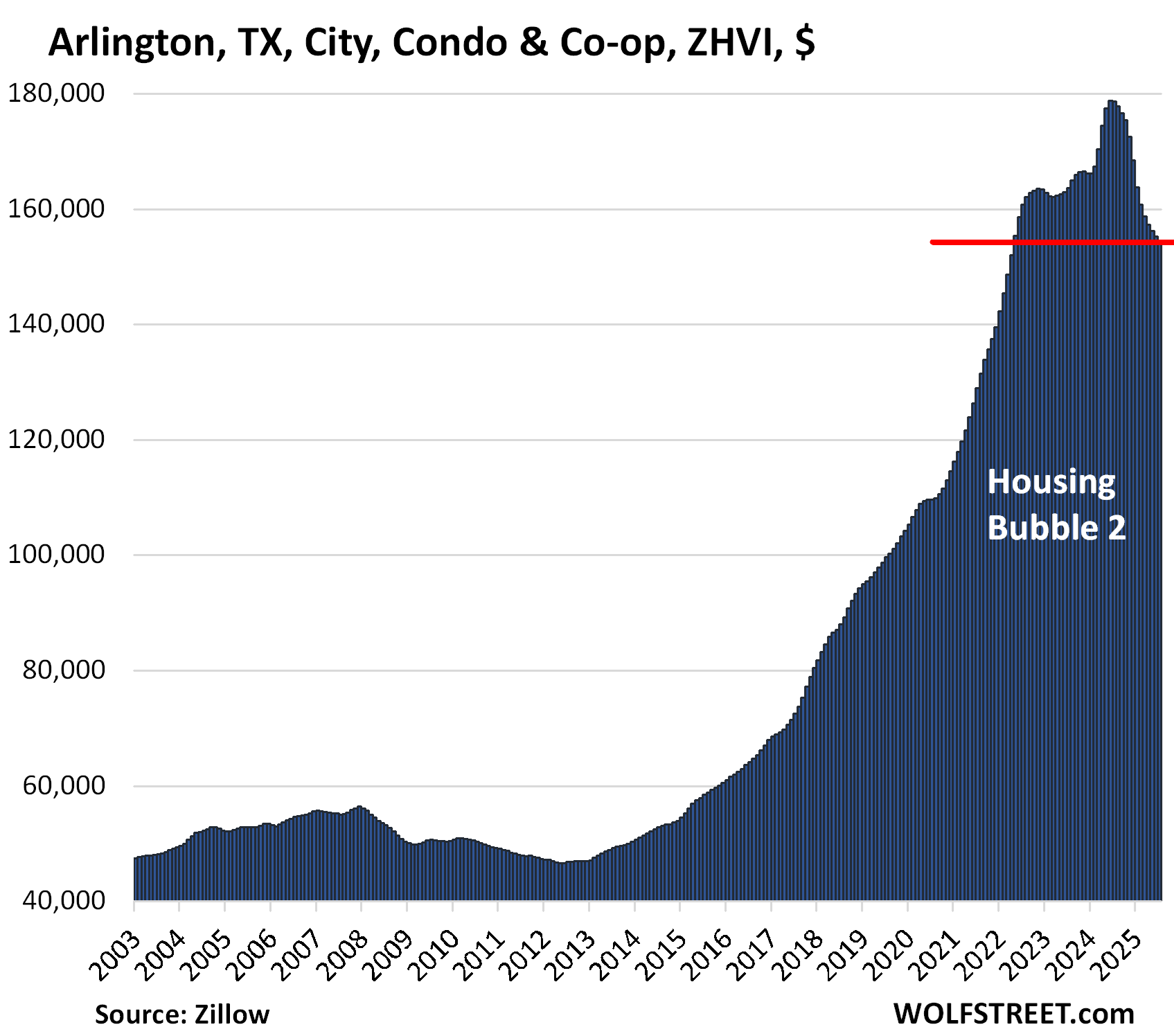
| Naples, FL City, Condo & Co-op Prices | |||
| From Aug 2022 peak | MoM | YoY | Since 2000 |
| -14% | -1.2% | -10.1% | 164.1% |
Prices exploded by 73% in just two years as buyers went FOMO nuts, and about one-third of that price explosion has now been unwound.
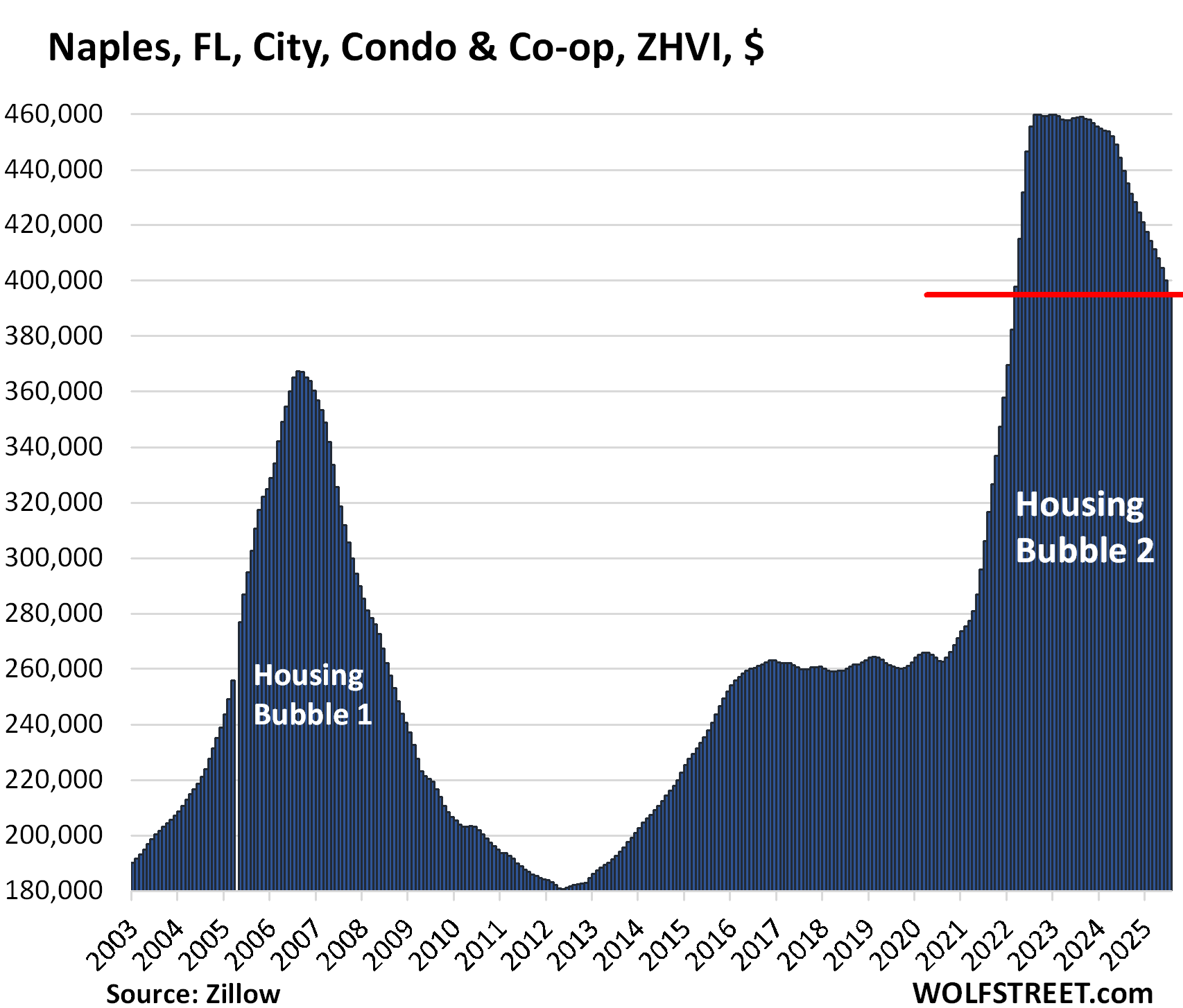
| New Orleans, LA, City, Condo Prices | |||
| From Jun 2022 peak | MoM | YoY | Since 2000 |
| -13% | -0.2% | -2.1% | 99% |
Back to 2016.
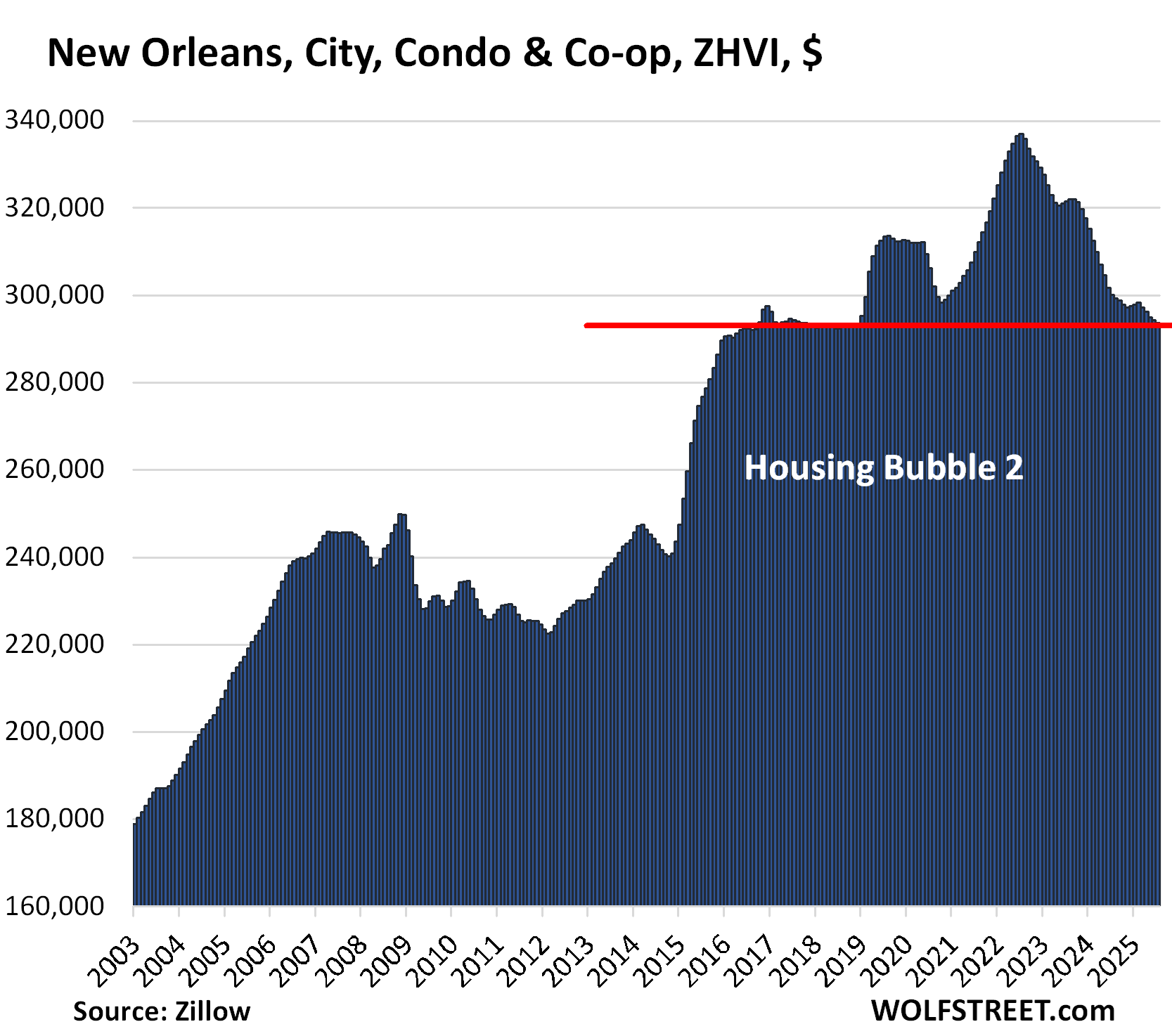
| Seattle, WA, City Condo Prices | |||
| From Jun 2022 peak | MoM | YoY | Since 2000 |
| -13% | -0.9% | -4.9% | 138% |
Lowest since October 2017.
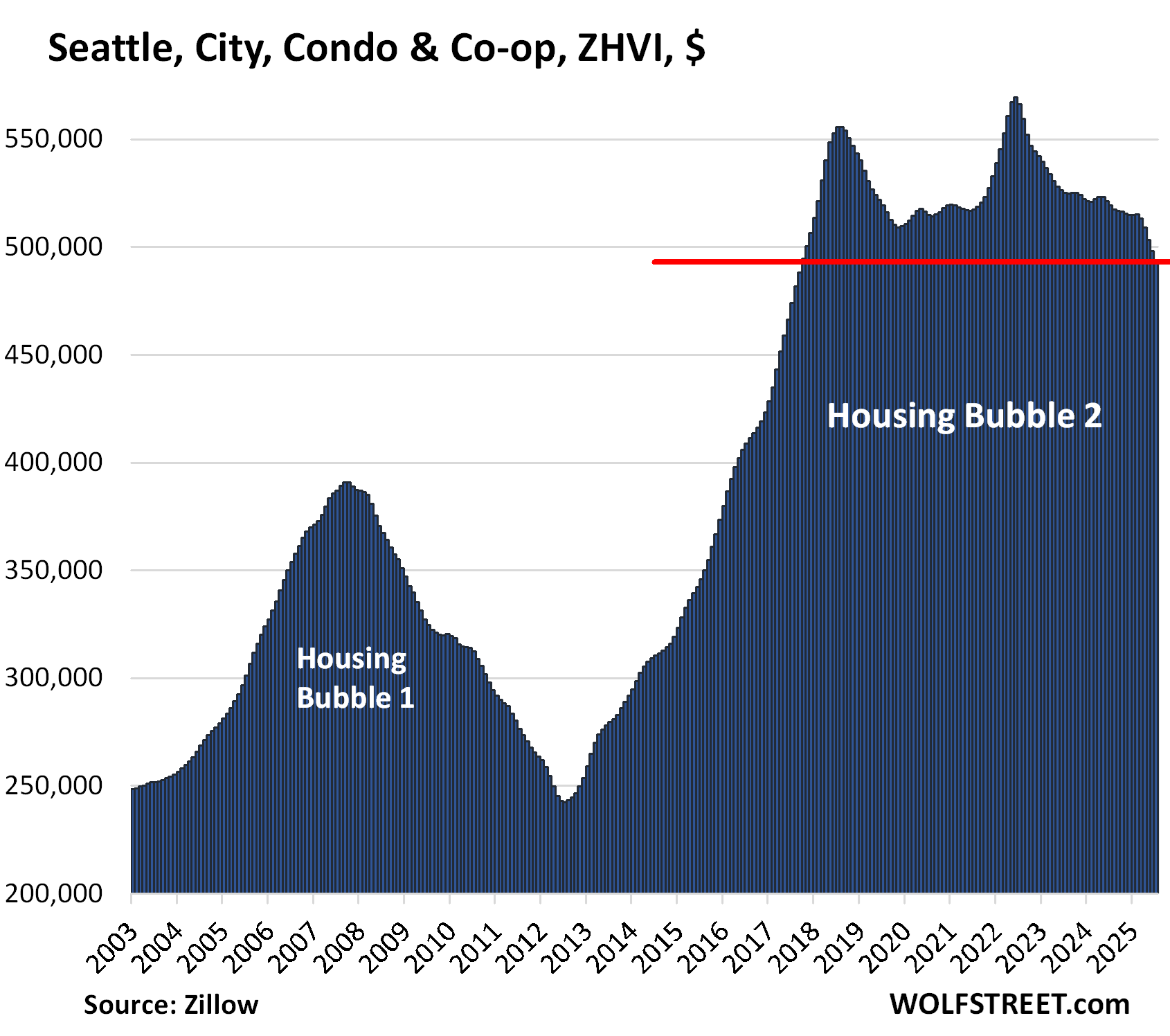
| Reno, NV, City, Condo Prices | |||
| From Jun 2022 peak | MoM | YoY | Since 2000 |
| -13% | -0.7% | -3.0% | 251% |
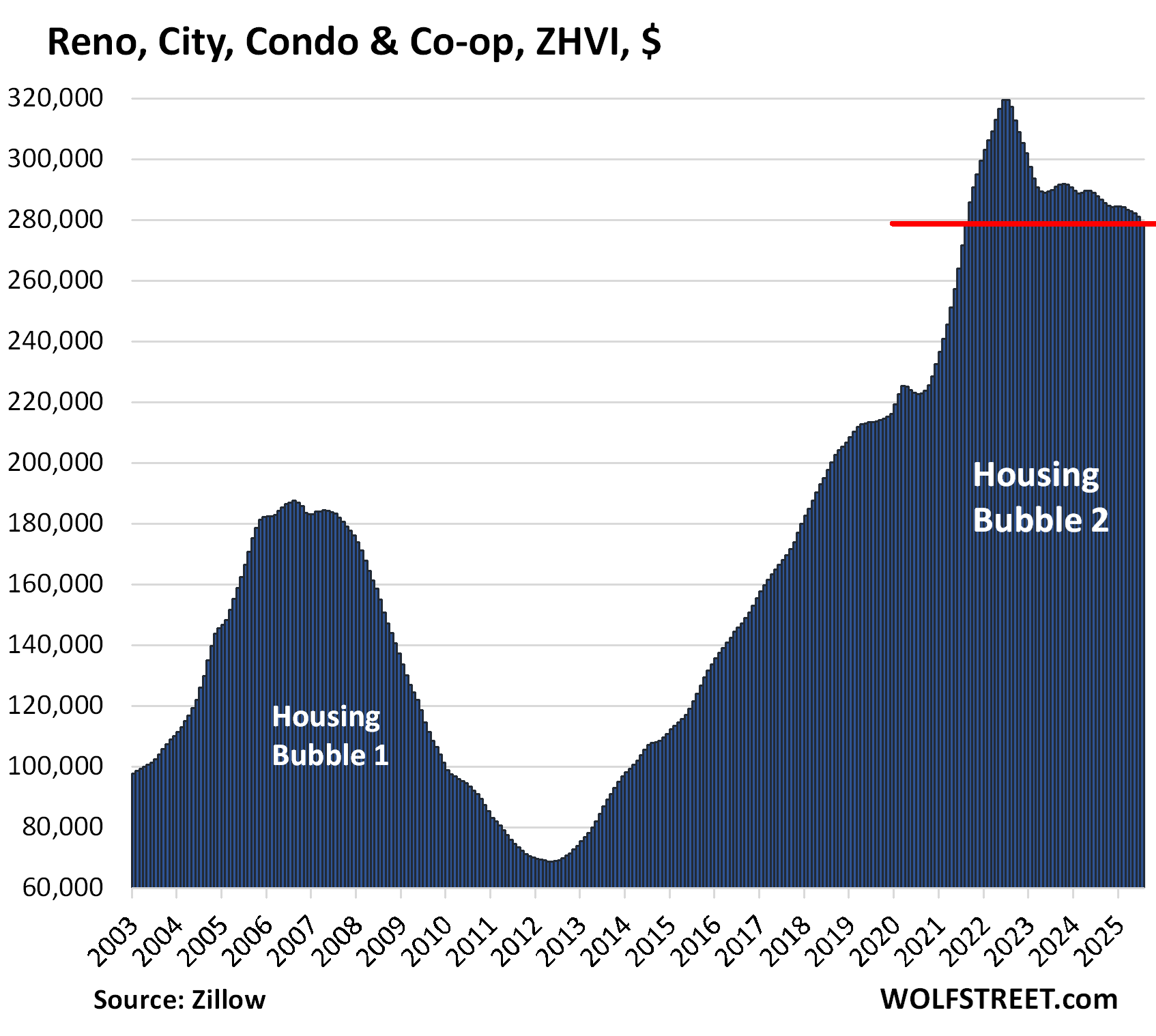
| New York, NY, City Condo Prices | |||
| From Jul 2022 | MoM | YoY | Since 2000 |
| -12% | 0.0% | 3.9% | 225% |
Prices are back to late-2017 levels, but are up 3.9% year-over-year after the spurt from January 2024 through February 2025. Over the past five months, prices are down just a hair.
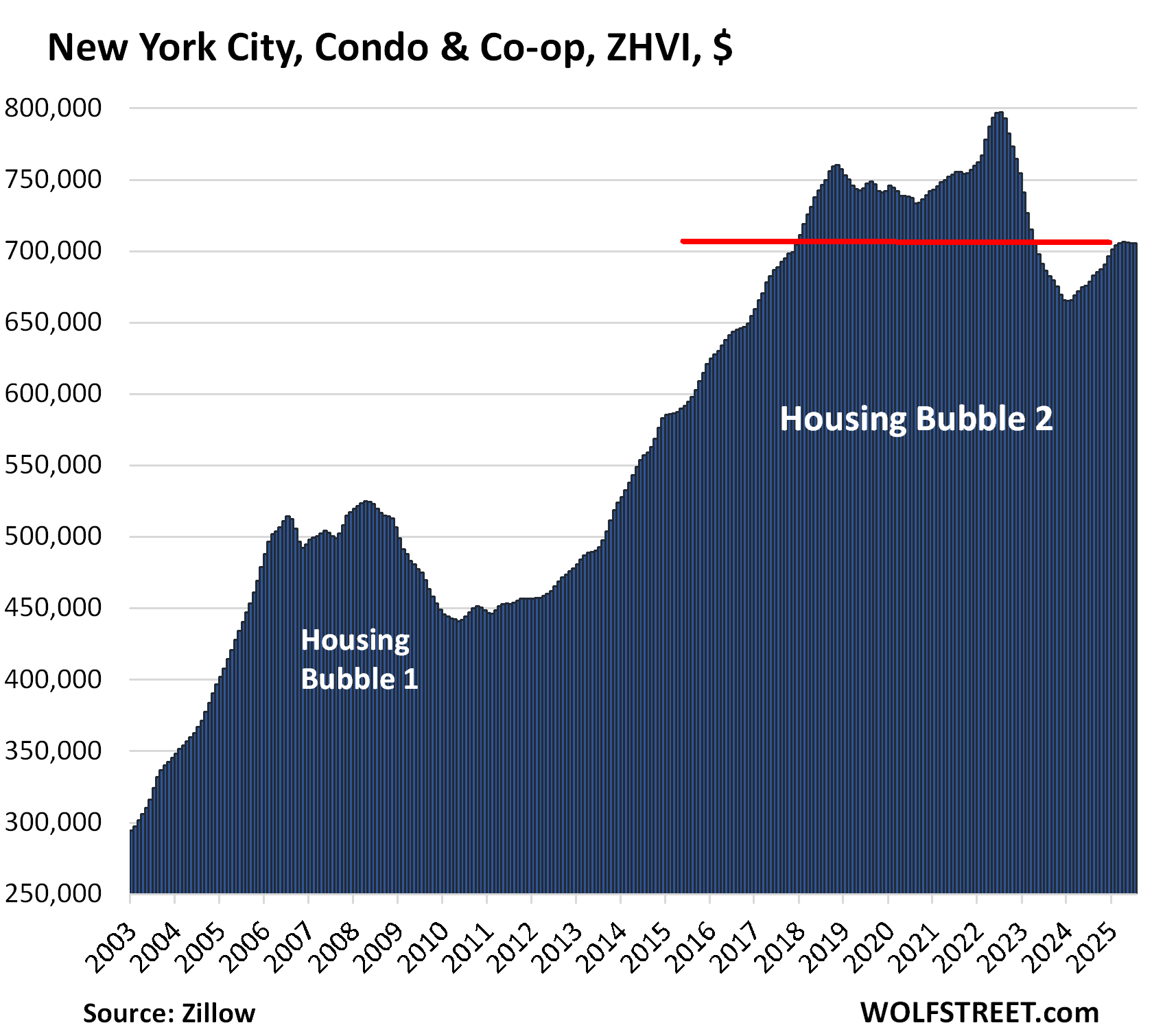
| Mesa, AZ, City, Condo Prices | |||
| From Aug 2022 peak | MoM | YoY | Since 2000 |
| -12% | -0.3% | -4.7% | 209% |
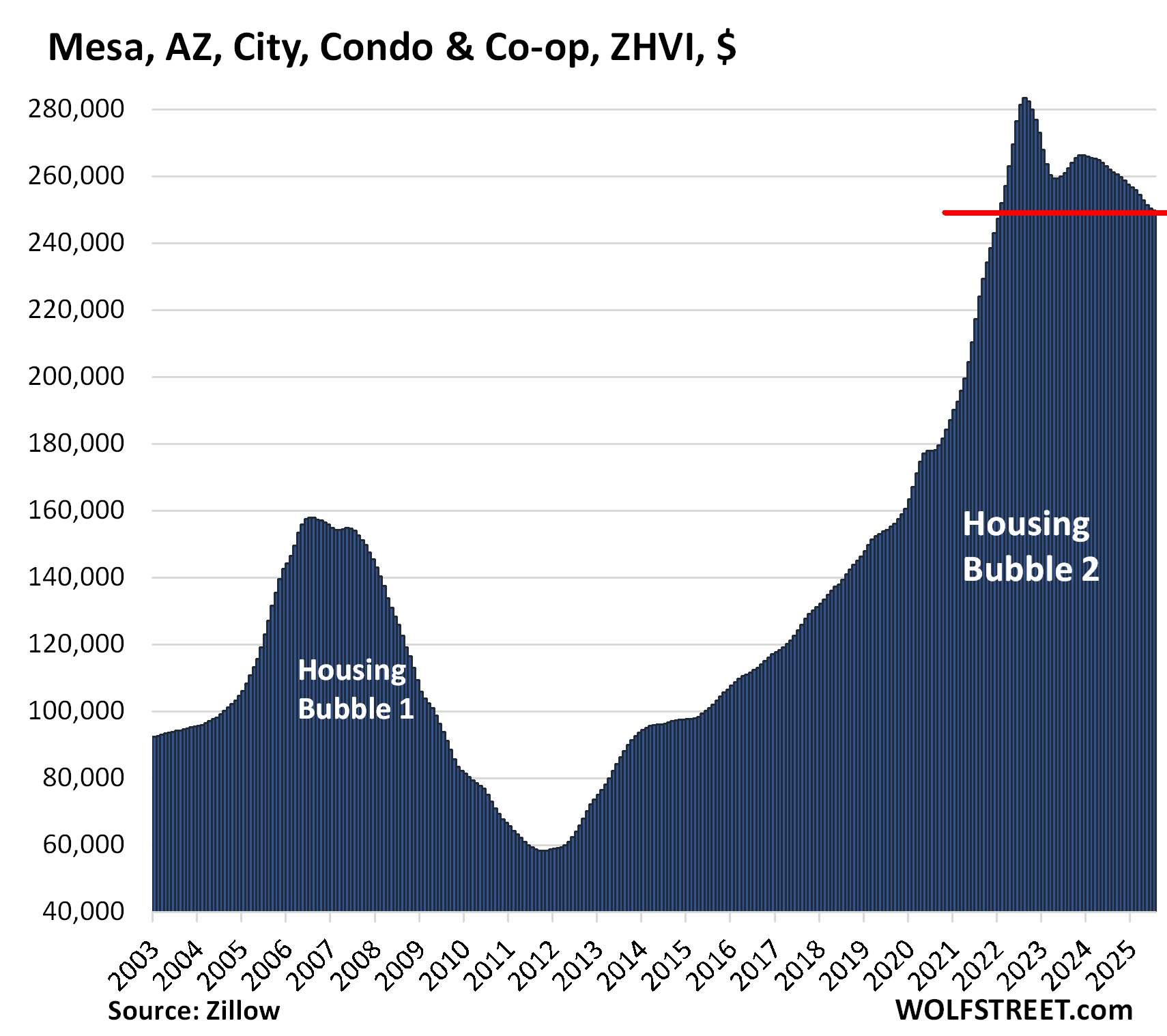
| Portland, OR, City, Condo Prices | |||
| From Jun 2022 peak | MoM | YoY | Since 2000 |
| -12% | -0.7% | -4.7% | 111% |
Back to 2016.
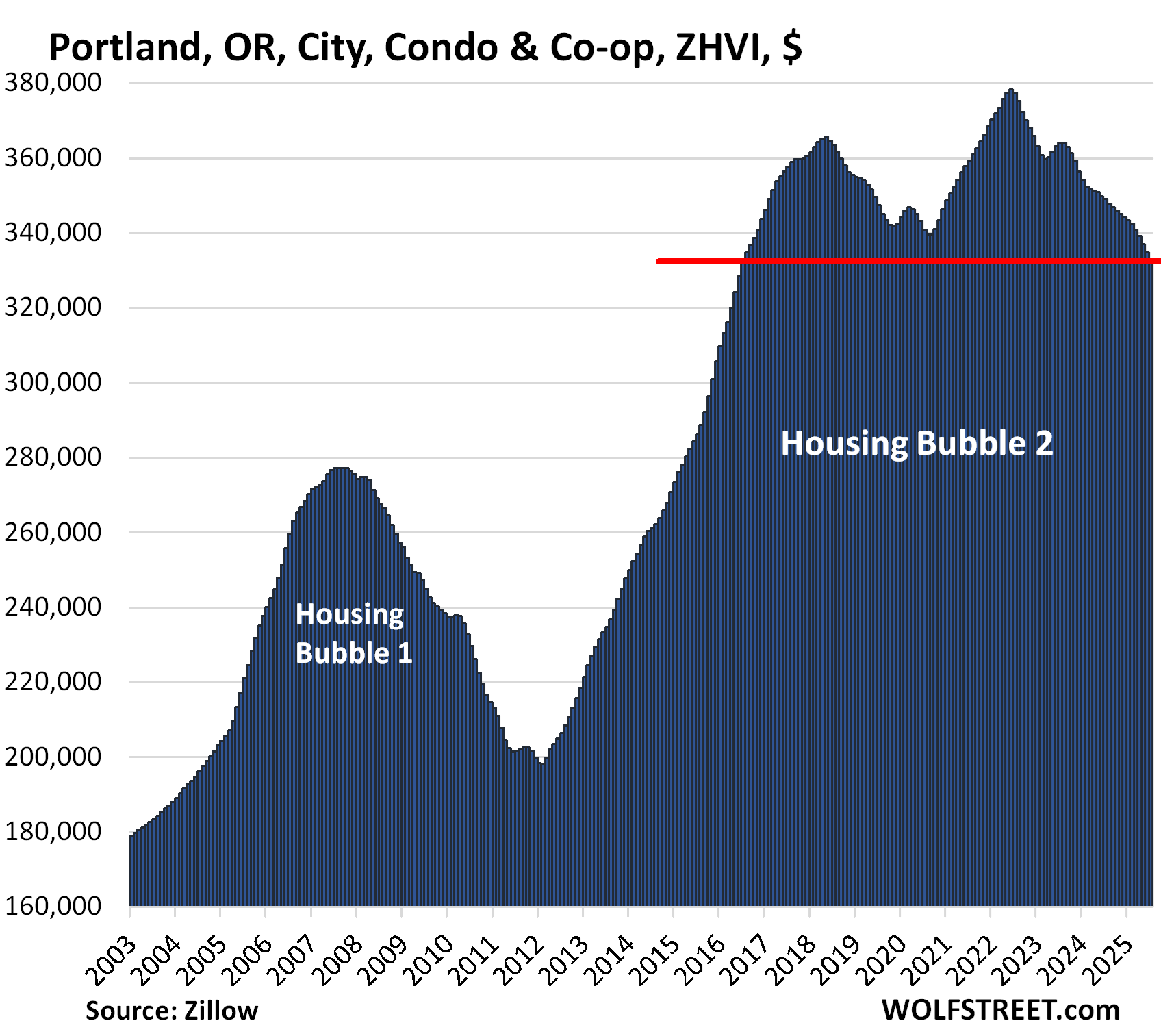
| Aurora, CO, City, Condo Prices | |||
| From Jul 2022 peak | MoM | YoY | Since 2000 |
| -12% | -1% | -8% | 210% |
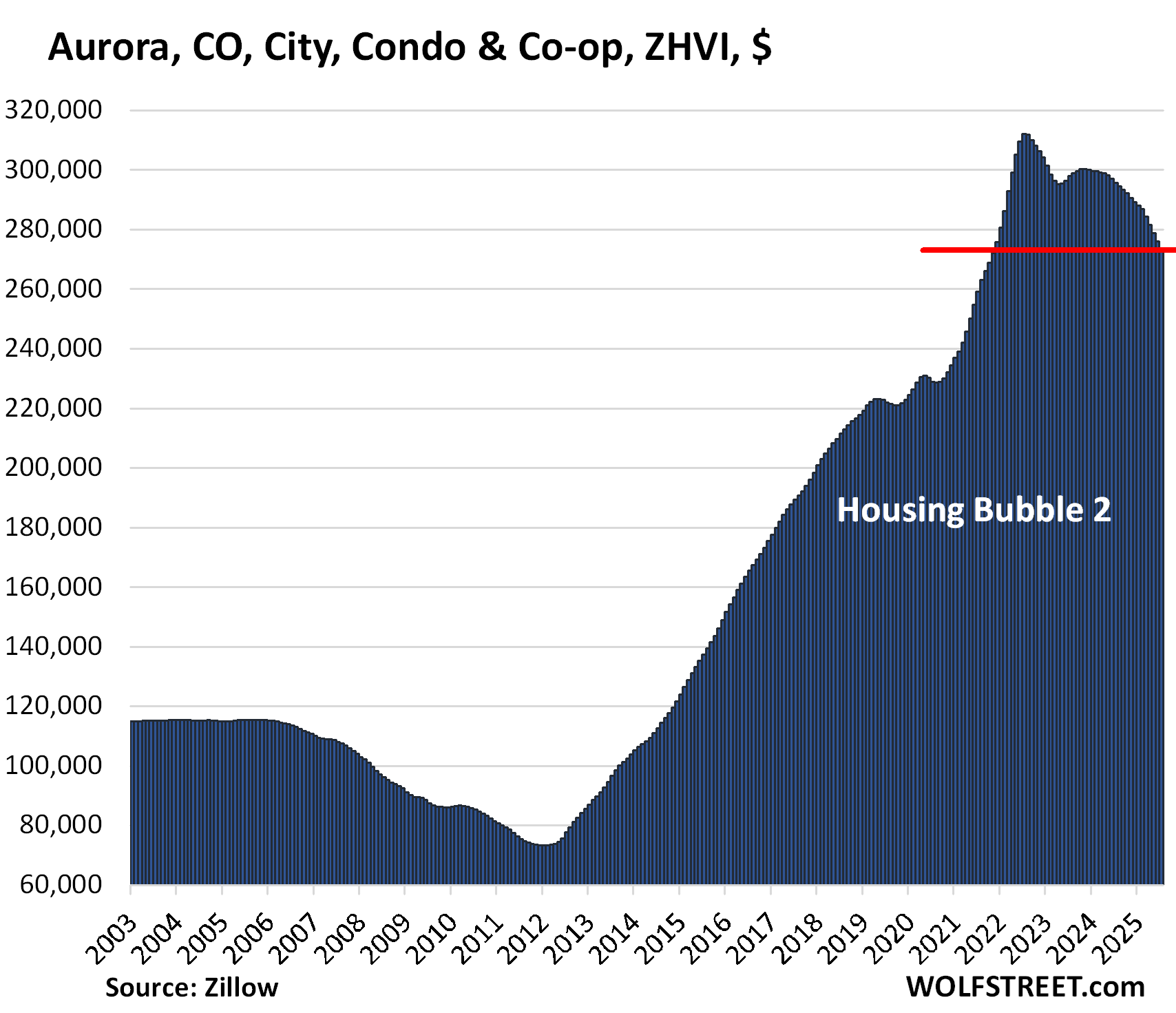
| Scottsdale, AZ, City, Condo Prices | |||
| From Jul 2022 peak | MoM | YoY | Since 2000 |
| -12% | -0.6% | -4.7% | 198.3% |
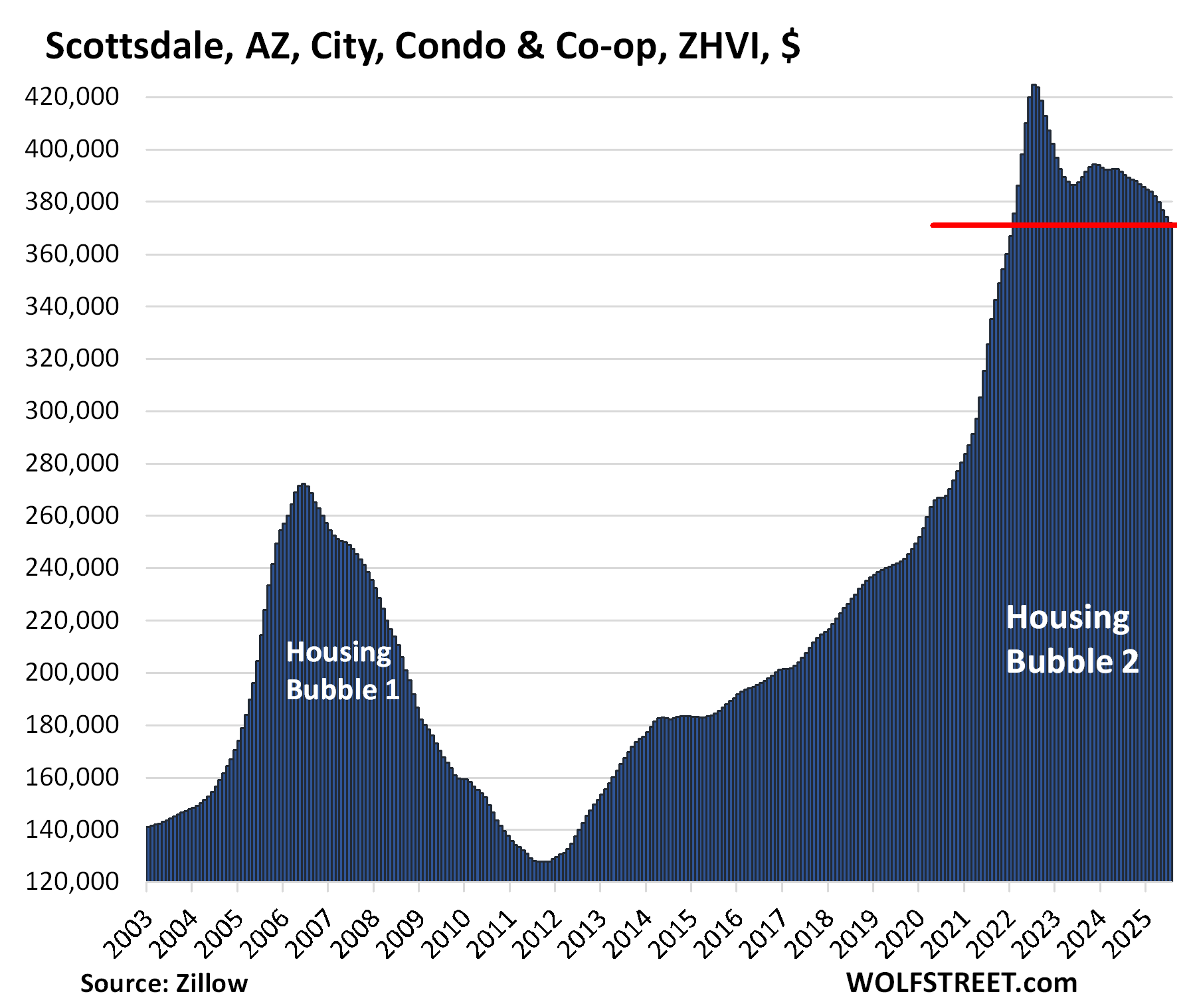
Condos are facing a big pile of issues:
- Too-high prices that exploded over the past few years.
- Eyewatering special assessments for long-neglected big repairs.
- Dizzying increases in HOA fees at many properties, in part driven by spiking insurance costs.
- A condo building being on Fannie Mae’s ever-expanding Condo Blacklist that makes financing a unit very difficult.
- Mortgage rates that have returned into some sort of normal range, from the interest-rate repression range.
- Foreign-based owners, such as aggrieved Canadians, putting their condos on the market.
- Investors trying to bail out: Condo rental market faces tough competition from new higher-end apartment developments that sprouted up over the past few years. And the vacation-rental boom may have also peaked. But condos are expensive to carry and if unoccupied quickly become a money pit.
And in case you missed it: The Most Splendid Housing Bubbles in America, July 2025: The Price Drops & Gains in 33 Large Expensive Metros
Enjoy reading WOLF STREET and want to support it? You can donate. I appreciate it immensely. Click on the mug to find out how:
![]()


Condo might be going through a bust as the graph showed but I bet if there’s a graph on median/average HOA fees by region, that’s one bubble that will likely not be busting anytime soon. If there’s one, I bet it would be a doozy to see the graph for Florida.
That’s probably the answer to the question I was going to ask, namely:
“Why do condo prices perform so badly compared to other classes?”
I’m guessing they also got smaller.
Your guess is wrong.
Even apartment sizes have been increasing.
Everyone in multifamily is building for the higher end (including larger units) because that’s where the money is. People who don’t have enough money need to buy or rent something old.
Toronto has a big class of ‘dog crate’ condos, about 650 sq ft. These were mostly built for the condo investors who always intended to rent them. For years this was profitable.
Now it isn’t, mainly because of mortgages being renewed at higher rates.
Condos are the canary in the coal mine….for the reasons Wolf listed. Insurance, property tax assessments and mortgage rates will ultimately have a similar effect on SFRs. Their only support is not having the risk of pooled maintenance and liabilities…
Condos have typically been leading indicators in bubble dynamics, rising faster and farther than SFRs during bubble inflation and falling faster and farther than SFRs during bubble deflation. The phases and dynamics of bubbles are the same and completely predictable but the narrative changes during the peaking and deflationary stages from “this time is different ” to “this place is different ” to “this type of collateral is different ” eventually to “my asset is different” and eventually capitulation.
sold my wsoma loft in November 2021. since then its market value has dropped nearly 20%. all the items outlined above are true. high interest rates, potential high special assessments, annual Insurance rate increases. IN San Francisco don’t forget water is very expensive and condo owners see it as a free item, and it’s not. he he uses the most water wins.
“he [that] uses the most water wins.”
Tragedy of the Commons
We replaced our debit card washers/dryers with regular commercial, and now everyone and their cousin is using them. The young president that made that decision has sold…
There are more apartments in one apartment block than there are apartment blocks in the entire ocean.
Prices must fall as a result
Suggest anyone thinking of buying a condo on ANY US coast should read the book, “Condominium” 1977 by John D Macdonald FIRST IMHO…
Tells better than any non fiction what has and could happen, especially considering the amount of corruption that was taking place when most of them were built ‘back in the day.’
@VintageVNvet thanks for the book recommendation (I just bought a used copy of the 1977 book for <$10). I have never owned a condo but I know many people that own them and after the skyrocketing insurance that is hitting everyone is added CYA costs since nobody wants to get sued (or have your photo on the paper if your condo collapses like that big one in FL) and if that means paying for extra (very expensive) studies and engineering reports begore and after paying for quality repairs and maintenance (that had been going up in price faster than inflation for decades).
I believe he used a condo that was tilting over the beach on Anna Maria Island in the 60’s as inspiration. Quite the bizzarity. Could be wrong though.
Don’t know about AMI in the sixties, as I was farther down coast at that time, but after Milton came by to say hello last October, there were several multistory buildings facing the Gulf, even on the east side of Gulf Drive, that were tilted unliveably off plumb, and all the houses on the south end of the island that had fronted directly on the beach were long gone.
And there doesn’t appear to be a bottom within sight. I assume that RE will take down the stock market at some point in time which is when far more Americans will feel the pain.
My advice to anyone is to pay down debt, avoid lifestyle creep, and get your financial house in order…
The sequence during the 2005-2012 Housing Bust #1 was:
(1) Condo prices in the most oversupplied markets started down first.
(2) Lower-end homes in less-desirable locations followed.
(3) The market weakness spread both “up” (the price chain) and “out” (geographically).
(4) Eventually everything that had “bubbled” got deflated.
My sense right now is that we’re deep into (1), well started on (2), and have had enough “spreading weakness” in (3) that people are beginning to notice that this is not going to be just a local bust…
but but but this time is different….look over there, this time there’s no subprime mortgage crashing the market concern therefore at worst the market will slightly dip but will just stay flatten out because of inflation and housing is a hedge against inflation as they say…
Above is the kind of narrative from REbubblejerk and we’re just bunch of doomers here…lol
“sUbPrImE cOnTaInEd”!! —bernanke 😆
Housing can NOT go down unless EVERYTHING is EXACTLY like 2008!!!
Real estate if on good terms is perhaps still the best hedge against AI because, like crypto, nobody can live there.
I believe there will be a significant RE downturn, but not to the same degree as 2008, that bubble was truly monstrous and lending standards were off the hook crazy then.
I always figured this one would be quicker since in 2008 you could at least cling to the fact that there had never been a nationwide housing crash and now that’s no longer the case. But so far I’ve been wrong.
I remember people said that but it was demonstrably untrue then, as it is now.
The proof is in two letters: S and L
You’re wrong about that sequence, at least in San Diego. High end in Rancho Santa Fe peaked last quarter of 2003, my town adjacent peaked spring of 2004 (when rate hikes started). Lower end neighborhoods were still seeing flippers into 2005 before the whole area froze and waited for the crash.
My exact sentiments. I’m a bit of a doom and gloom person but one has to wonder if this really is the canary in the coal mine. Wolf refers to the beloved American consumer as drunken sailor’s and it really does feel that way where I live. People are living large these days in all dimensions…..
My exact sentiments. I’m a bit of a doom and gloom person but one has to wonder if this really is the canary in the coal mine. Wolf refers to the beloved American consumer as drunken sailor’s and it really does feel that way where I live. People are living large these days in all dimensions..
My exact sentiments. Don’t think this will all be neatly contained to the real estate market
Yes. Don’t think this will all be neatly contained to the real estate market
You would think that Boise is a 100% built out island like Manhattan…
Don’t people realize that new builds (otherwise known as supply) can continue to come on-line for a long, long, long time in places like Idaho?
Not to mention the elevated property taxes based on the extraordinary price increases of the past few years. Ouch.
And the cost to build new and more schools!
@Anthony A. The average number of kids per woman in America has dropped from ~3.0 in 1980 to ~1.5 today. Since I don’t see the trend changing over the next 20 years I predicet more school closing than school building. Most of my Bay Area 60 someting friends have kids in their 30’s. Most of the kids have advanced degrees, but not one has a grandkid yet.
I don’t have a grand kid either and my daughter is too old for one now. Her friends have children, but usually one of two. But we are from the northern states and now in Texas.
Around here where I live, there are new schools going up as the thousands of new homes are built. Mostly to house the Hispanic population which is increasing by leaps and bounds around this part of Texas. No birth control going on from what I can see for probably a few good reasons.
Wolf – now we’re talking. Numbers talk. They also show a trend. This one is ugly.
If someone bought a $400K condo at the top (‘22), in Oakland, they are now down $104K.
In Austin, they would be down $96K.
SINGLE FAMILY HOMES WILL FOLLOW.
Those year-over-year numbers are also scary.
As the self-appointed junior associate at Woof Street Media Empire, I say the prognosis is terminal. There will NOT BE a housing rebound.
How long this circus drags on is difficult to say. It could be either a crash landing, or a prolonged,
slow miserable decline with horrific home sales numbers.
But this market is FINALLY going back to where it belongs!
We can only hope for a return to sanity, but I really do worry about what other bailouts lie around the corner to further screw us over.
The relentless thing is, there is a bunch in the pipeline. Unlike a house, it takes 4 to 5 years to build a tower of condos. All the developers built and are building the most floors, and therefore units, as possible. Short of actually halting and putting the project up for sale or receivership, it goes ahead. The folks who bought pre- construction, hoping to lock in the price and maybe flip are underwater, but the developer still demands they close or be sued. As sales stall and more units started in a different market keep arriving, the situation gets worse.
It would be interesting to have the information on how many are in towers and how many in developments that are lower and spread out.
Outside the big cities there is going to be more low density stuff: strata 4 -6 8 plexes etc, or row housing. Inside the cities’ cores, the land is too expensive to build other than up, the higher the more sq ft can be built.
Tons of building in outlying Portland areas. Traffic so bad it’s like SoCal now, hour to go 15 miles at times. But hey, at least they have water unlike SoCal which last time I checked was needed to sustain life.
Could be worse though, anyone buying a condo in Oakland must like playing Russian roulette
If you look at the data presented above by Wolf, it looks to me like prices are still way too high. They are not even down to the peak in the first bubble. Considering the buildings are older and now and insurance rates have gone up, etc….the prices still seem high. “Bust takes shape.” If so, it has a ways to go. I think the best way to think about housing prices is affordability. Of course, that is difficult to measure, since different locations and demographics vary so much. However, there is a sense that housing is still too much unaffordable for too many compared to the past, so prices still may be way too high, regardless of the pull back or excess supply.
“Fannie Mae’s ever-expanding Condo Blacklist that makes financing a unit very difficult.”
Does this not indicate that Taxpayer Supported Mortgage Insurance is boosting prices of these condo apartments? Up here, CMHCs justification for existence is to make homes “affordable”. I believe if CMHC were wound down, these condo apartments would actually become more affordable in the old fashioned way that word was used.
yes, same thing here… government housing subsidies, such as mortgage insurance, have the effect of increasing property prices. The government should not be in the mortgage insurance business.
Or the flood insurance business either, imo.
The US government got into flood insurance with the NFIP (National Flood Insurance Program which is part of FEMA in 1968 when all of the insurers in the US stated they would no longer cover catastrophic losses caused by flooding in the US. Ever since then the NFIP has been radically underpricing flood insurance and is now drowning in deep losses.
Cape Cod house on trout river in TN I’m considering buying just got moved into FEMA floods zone this year. FEMA’s new map shows the flood level 16.5 FT (!!) HIGHER than previous map. Even then it is only 1.2 ft in flood zone. I think FEMA was seized by global warming zealots and the new numbers from the “experts” are wrong. It appears they now model a major TVA lake blowing the permeable fuze plug in the saddle dam sending river channel below from 30000 cfs max to 40000 cfs. If that happens, yes I flood. The house isn’t selling as a result, creating opportunities for skeptics like me. The NFIP insurance only goes to 250k max, with a 10k deduct. it is still 4k-5k per year.
I hate to see anyone take a loss on anything of import, however I sure hope more and more and more condo owners will sell and return to their working years home area. Florida has got to reduce their population or the state will sink into the Atlantic ocean or the Gulf of Mexico. It is a mess down here.
Uh Milo,we call that the Gulf Of America……,just saying!
It’s pretty egocentric to think that only our country matters in the world. A very selfish outlook and not terribly neighborly. Just sayin’
Gulf of America is surrounded by North America, just sayin’.
I feel sorry for anybody who bought at the peak, especially anyone who forked over their savings just to get a condo and start a family. This could be a disaster for them.
I don’t unless they got a gun to their head forcing them to buy or came to a lot of F U money and taking a loss means nothing to them…
Maybe FOMO do have a price and they are about to find out…
@Phoenix_Ikki you are correct that nobody was “forced” to buy a condo and due to the super low rates when the market peaked few will be “forced” to sell. If they don’t want to sell, they can stay or rent the place and rent another place. On the SF Peninsula we didn’t have a big percentage decline in value like places in the CA Central Valley (or Vegas or Phoenix) that dropped on average 50%, but most were back at all-time highs in less than a decade and today almost everything is worth more than 2005-06 (often 50% more). in 2008-12 LOTS of people were “forced” to sell. People that like where they live and don’t plan to sell don’t care what their home is “worth” (and in CA if the value drops below what you paid you can lower your taxes and get thousands to invest in something else every year).
If they bought it as an investment and not a home-nah. I don’t feel sorry.
Feel.sorry for.what? Bad choices you and I didn’t make? Can’t feel sorry for the ignorance
I live in seattle. I bought a condo 2 years ago, it’s a great community with landscaping, a view of downtown and the bay and responsible reserves. But when I was shopping for condos, hooboy there were some real optimistic dumpster fires out there. I suspect a lot of those are contributing to this swing in down prices here.
Yes, it’s always the other condos whose prices are falling. The price of your condo will never drop as long as you don’t sell it. It’s worth whatever you imagine it’s worth, doubles in value every year, whatever. Make your payments, pay your HOA fees, and be happy.
Or he got a great development and price is what you pay value is what you get. While some are saving others are living as you have to live somwhere and rents are off the charts. another one for you the market can remain irrational longer then one can remain solvent. So how to time a housing market when rents are also out of control. Agree the govt should stick there nose out of it good luck with that.
Reminds me of the home sellers who didn’t get any offers after having their home on the market for months. They just pulled it off the market so they could keep their imaginary value intact.
Real Estate Appraisers are supposed to be measuring price changes due to market conditions, and verifying concessions packed into the sales prices to help prop up the prices.
And, yet, the industry is almost completely silent on these two issues. The GSE’s expect that appraisers are doing both, and when they find that they are not, are putting them on Do Not Use Lists as well as turning them into License Boards.
Once Concessions are deducted from the sales prices, virtually every market area is declining.
The definition of market value required for lending is in terms of cash to the seller, net of concessions.
The prices being reported by the Realtor groups are the gross prices, not net of concessions. No national reporting of real estate trends deducts concessions.
In the new home market about 13% of the sales prices are made up of concessions. What happens in the new home markets soon occurs in the resale markets.
It is likely that most real estate markets will be reporting declining prices even when they are being propped up by concessions.
Wolf,
Prices went up 250 to 300%. Hence this 15% reduction is nothing. What do you say? Thanks
1. Something goes up 1,000% and then goes down only 100%, it not only gives up ALL the 1,000% gains but falls all the way down to zero. Total wipe out. Percentages are kind of funny that way.
2. They went up 200% to 300% in 10 years.
If something goes up 300%, then drops 15%…that 15% loss is 45% loss of the ORIGINAL value before it went up.
That’s not chump change, and if you bought at or near the top that’s a hard loss to swallow.
If you bought an apartment or a house a year ago for 500k, for example, today it costs 75k less. But what are these 75k dollars to you? You collect money from trees.
I own 2 condos
One I live in most of the time, in the northeast. Got a good deal (relatively) on it. I never expected to make one cent, it was just convenient. The assessments suck, the dues are exorbitant and I love it far more than living in house.
The second is a ski place, I got it about a year ago- I probably overpaid, but it was off the peak and I like skiing- the sellers got it during covid and held for 4 years and made about 100k off it. I dont expect to make a cent, and expect to lose my shirt on it. But I like to ski.
I have no point other than to tell you this. I never expect to make a penny on owning a condo, anyone who does is not very smart.
yes yes yes. The value is worth it. enjoy.
Condo prices diving faster than a cat off a hot tin roof! If my condos value dropped 20%, at least Id have a sea view—of my underwater mortgage. Wolfs numbers are scarier than my HOA fees. This bust is shaping up to be a real cliffhanger!
Interesting what will happen with insurance prices already very high and climate change will continue to escreibate that. Insurance companies will either not cover in those areas, insurance prices will be too high and in many populated areas where income levels can’t be afforded. Seems like in areas the government will have to be the insurer of last resort. Property values unlikely to fall significantly but seems like when they move low enough investors might seek to buy up property and boost rent to make it work.
It feels like in so many ways the US is wholly unprepared for climate change impacts on all fronts.
I have some older friends whose HOA insurance (up twice since January) and fees are more than their mortgage now because of their siting in a fire canyon. The discount for any potential sale because of these has them worried. Had to ditch the outside charcoal grill too so no more smoked ribs or brisket for consolation.
Well with insurance if someone will pay enough, they’ll be insured!
Jump in the risk pool, the water is fine!
The climate will do what the climate will do. It always has and will always change whether we are here or not. People need to realize that certain areas are higher risk to live in. Coasts, fire prone areas, and flood plains buyer beware.
Detroit is the winner in appreciation since 2000! Detroit pride :) Cass corridor was crack heads fear and crime in the 90s, and early 2000 now it’s nice restaurants with lines, nice cars parked on the curb and all kinds of diverse people out walking around enjoying life! Deee Troit! Hardy people in Detroit, whatever happens Detroit will be ok! So many people already left decades ago, it’s going to continue to grow. It’s one of the few cities; cheaper to own a home than to rent home.
Condo prices diving faster than a cat off a balcony! If my condos value drops any more, Ill be living in a cardboard box. Thanks, Wolf, for the splendid bubble-bursting insights. Time to invest in a tent?
“If my condos value drops any more, Ill be living in a cardboard box.”
Your condo will still be the same physical structure, roof and walls and all, even if your city assessor says it’s worth $1.
No idea why people are so obsessed with the theoretical resale value of properties that aren’t actually for sale.
Please add Sanjose
San Jose will be allowed onto the list when it qualifies for it. The minimum is a drop of 12%. San Jose isn’t there yet, it’s down 6%, though it made good headway with a 0.9% decline in July.
Condos are getting hit pretty bad in Indy. Multifamily still flying off the shelves. My theory is the homeowners are tapped out but the investors haven’t gotten the memo yet.
Depending on the city, this is just getting started. I am seeing nice 3 bedroom, 3 bath units coming on the market for 250K. If you have cash/T-bills, many buying opportunities will be forthcoming. Property valuations are also resetting (the tax and maintenance costs are what is driving many to sell in the first place). Hopefully, this continues and we finally get a true “buyer’s market…”
Regarding taxes … I’m not quite sure what to call it, but those who did not protest assessments got screwed this year.
In Boulder County Colorado (a “hot” RE market since the ’90s), the County Assessor handed out significant increases in single-family-house assessments this Spring, but protests that included valid comparables instead dropped 10~12% based on my own experience along with a few friends.
We bought our 2 bedroom “age in place” ranch in April ’22 for $730k. It was assessed in 2025 at $785k but after protest was reset to $691k.
Agreed. Smart people always protest the assessment, but especially when it is blatantly and grossly overvalued.
My point is simply that I am seeing things sell at significantly reduced prices, so it will be easier to fight the county assessments now, which hasn’t always been the case.
One risk element for condos that needs further discussion is the fellow owners. When they have problems like job loss or whatever, that can screw up the association finances. Add in a miscreant or misanthrope or two and that leads to more blacklisting.
If you want to buy a condo, some due diligence on your new fellow owners is necessary, even if challenging to do.
How would that ever help when, even assuming the impossible of learning about the tendency of hundreds of random people to pay their bills, they could all sell at anytime to hundreds more random people?
Scottsdale Arizona. Interesting. Seasonal rents are holding pretty steady from last year despite the underlying prices dropping.
It turns out that anyone who “won” with the once in a lifetime financing of 2022-2023 actually paid 2033 or higher prices and is now stuck waiting for the world to catch up. Thank God the Fed will never mess around in the MBS market again, right?
Not a condo, but a townhouse down the street just went to pre-foreclosure here in Bend, Over-egon.
I love foreclosures!
Off topic: Dear CNBC; Do you really think it’s vital to keep us apprised of Dogecoin, in yr markets heading under Crypto? Latest quote 21 cents.
Why not quotes on OJ, pork bellies. cotton ( strict low middling) or SOMETHING relevant to anything? .
“SOMETHING relevant to anything?”
Yes, but it’s relevant for people for whom Dogecoin is the ticket to endless riches and paradise 🤣
Equities will follow this path eventually as perception of wealth turns. Will the ” drunken sailors” sober up, even though they are so good at paying off their credit card balances…?
Condos in my Scottsdale neighborhood are down 12-15% from peak. Some are under $300k now. I happen to like living in a condo. I don’t have to do any work around the place and its easy to keep clean. The location is prime. It would have cost about 3X to buy a decent house where I live.
In the last week, Crains Chicago Business, published an article on the high-end downtown Chicago condo market. It was all doom & gloom. Many people who bought in the mid 1990s, cannot even sell for what they paid decades ago. The property taxes are the highest in the country, along with unreasonably high assessment fee’s, and high interest rates, have doomed the R/E market.
Ken Griffin founder of Citadel, relocated his entire empire to Miami, citing Chicago’s high crime, high taxes, and unfriendly business climate. The leftist “wack job” politicians lead by Gov. JB Pritzker, and Mayors Lightfoot and Johnson, told him goodbye. Guess what? He was the largest benefactor to philanthropy and the arts. All that money now supports causes in Miami and Florida.
If NYC elects that marxist fraud Mamdani, it will follow Chicago’s demise.
The city of Chicago has a long-term chart for condos that looks almost sane compared to the others by now. This is mid-tier, and prices are down from the Housing Bubble 1 peak in 2007. There are other condo markets like that in the US.
Headline on Wolf Street in 5 years…”Condo prices in 20 largest metros down 60% to 95% from their 2022 highs. Now may be your time to buy.”
Lotta cities in FL area.
Wolf’s causal factor list is spot on.
I was double whammed this year by substantial HOA monthly increases and a special assessment. Some of this is driven by insurance, some by new state laws following the building collapse in Miami, some by an immense expansion in new apartment availability. There are also some hidden reasons; for example, during Covid a lotta on-site maintenance types decided the Covid stimmy was a good deal and they quit. Many did not return after Covid waned. More expensive hiring such folks in response to emergent needs.
Don’t forget realtor fees and closing costs. When your condo/house is down 15-20%, you are really down 21-26%.
S&P Global writes that “The resulting rise in selling prices for goods and services suggests that consumer price inflation will rise further above the Fed’s 2% target in the coming months. Indeed, combined with the upturn in business activity and hiring, the rise in prices signaled by the survey puts the PMI data more into rate hiking, rather than cutting territory according to the historical relationship between these economic indicators and FOMC policy changes”.
Some sanity was voiced today.
Meanwhile, apartment rents in SF (what competes with condos) are up 11%, 2 Br rent now about $4600/month.
Median 2-BR asking rents in SF (which is what you’re citing) were $5,000 at the end of 2015, and then dropped a lot. I covered this at the time. In early 2024, they started increasing again but still haven’t gotten back to where they had been at the end of 2015. Now at $4,779 for a 2-BR (all Zumper data). So essentially no inflation in asking rents.